AMD Ryzen 9 7950X vs Ryzen 7 7700X: which processor is right for your rig
We're here to help you decide between AMD's best new processors
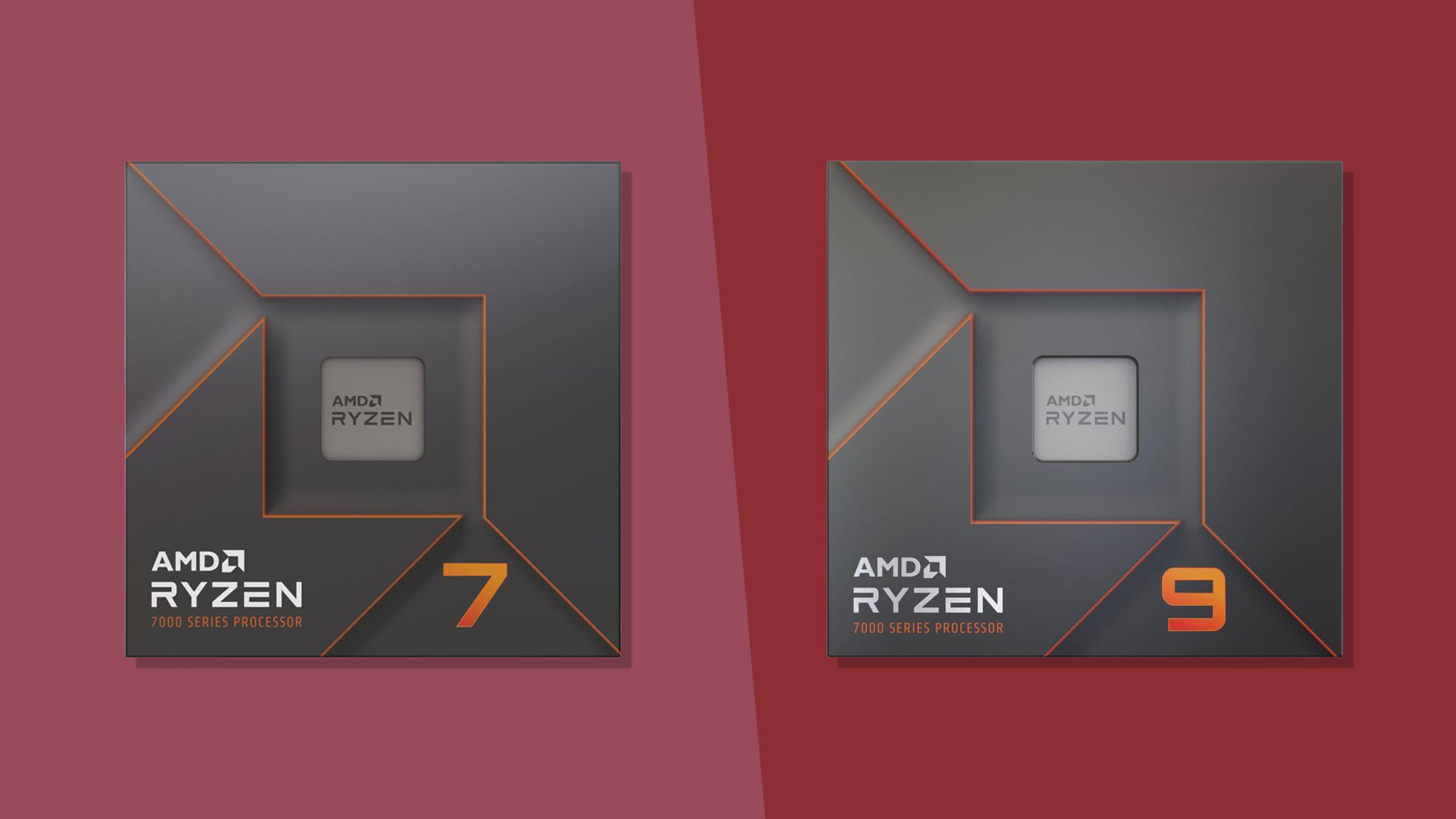
The new AMD Ryzen 7000 series processors have now hit the market, and they have landed with quite a splash, earning covetted five-star reviews from us for two of the chips in the initial launch lineup, while the remaining two are looking just as solid as we continue to test them.
But now that the chips have gone on sale, the real question is which one should you buy, especially since the two the we have reviewed so far, the AMD Ryzen 9 7950X and the AMD Ryzen 7 7700X are two of the best processors ever made as far as we are concerned, and ultimately you can't go wrong with either.
There are some differences though, including price, performance, and the specific niche that each chip is intended to fill, so it's important to know which one is the best for your needs and budget.
Fortunately, having just done all the leg work in terms of testing and analysis, we're here to help you make sense of the two chips to help guide your purchasing decision.
Ryzen 9 7950X vs Ryzen 7 7700X: Price
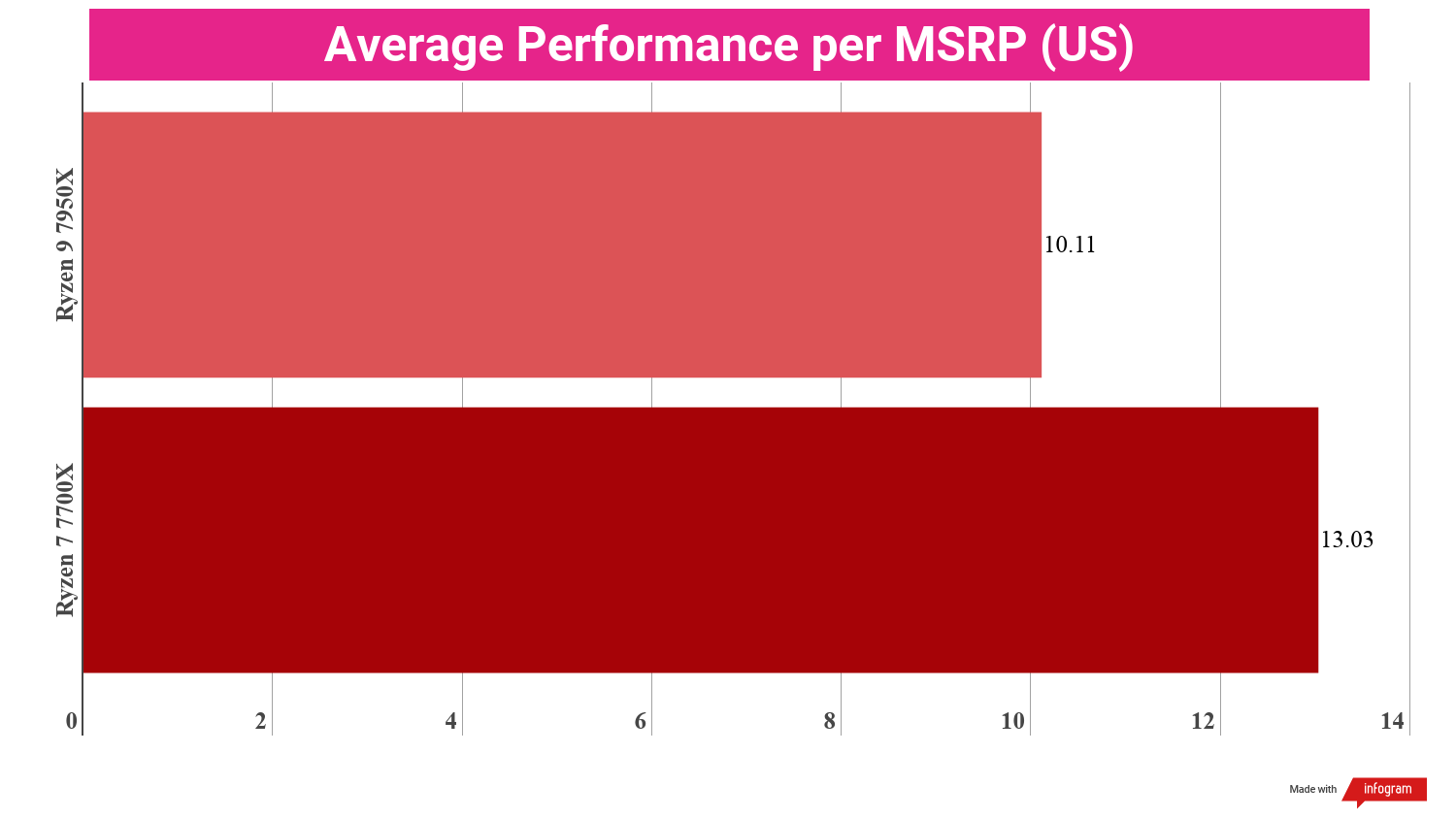
The AMD Ryzen 7000 series surprised a lot of us when it was officially announced since none of the initial launch lineup saw prices increase per se. The Ryzen 9 7950X actually sells for $699 which is $100 less than the Ryzen 9 5950X did when it launched in 2020.
The Ryzen 7 7700X sells for $399, and while there was no Ryzen 7 5700X, there was a Ryzen 7 5800X, which has an MSRP of $449, so the 7700X is fairly in line with what the price of a 5700X would likely have been.
Comparing the 7950X and 7700X on price is fairly straight forward, obviously; the 7700X is $300 less than the 7950X, but there is also more to the story than that. In our reviews of the two chips, we noted how both provided outstanding performance for the price, especially compared to the chips they were replacing.
Sign up for breaking news, reviews, opinion, top tech deals, and more.
Once we averaged all of the various performance scores for the two chips, we divided these scores by the chip's MSRP to come up with a value score representing the amount of performance each dollar spent would get you.
The Ryzen 9 7950X scored a respectable 10.11 by this metric, but the Ryzen 7 7700X scored an even better 13.03. Compared to other chips in their respective classes, these represent best-in-class value.
Ryzen 9 7950X vs Ryzen 7 7700X: Raw performance
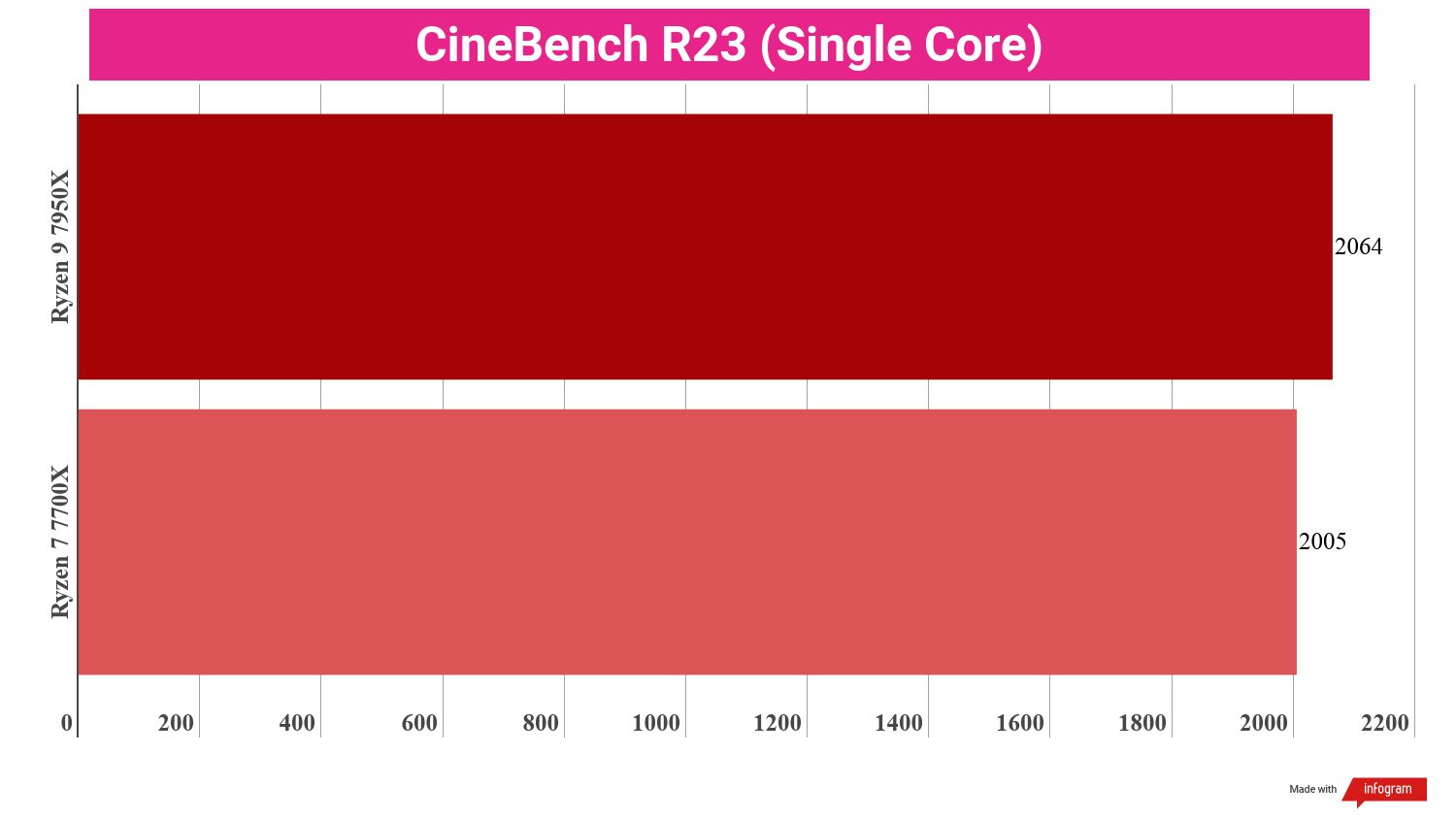
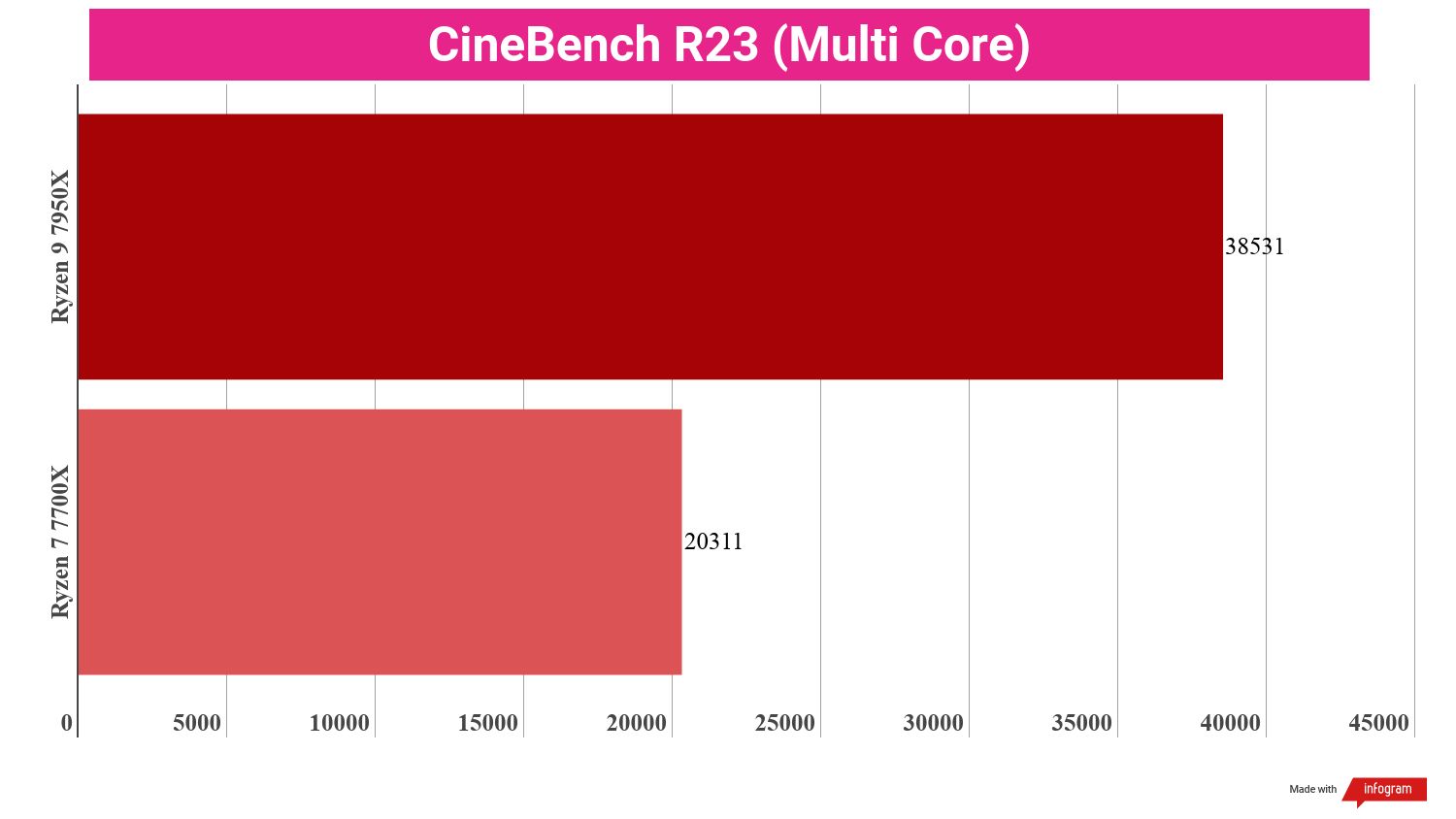
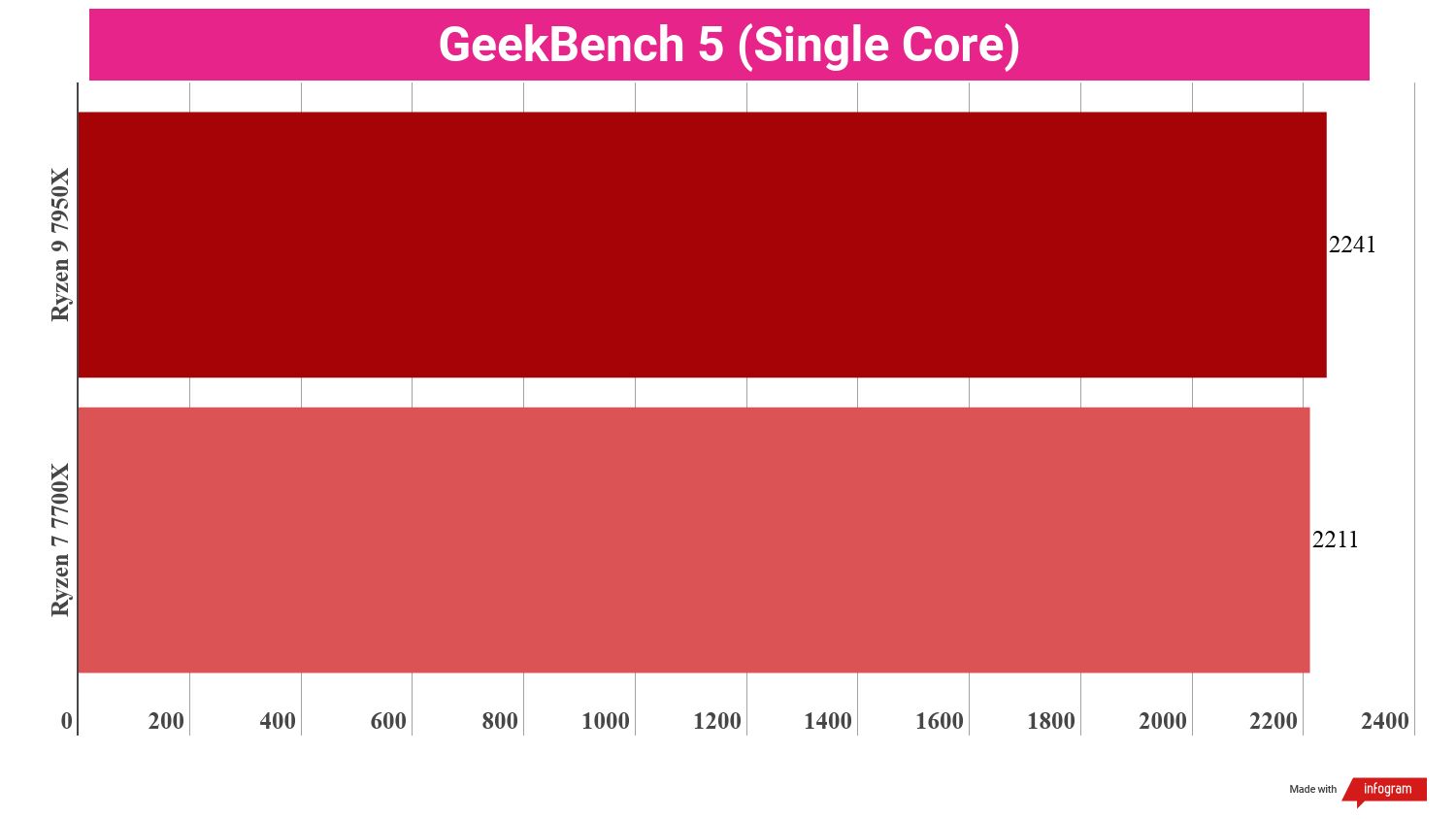
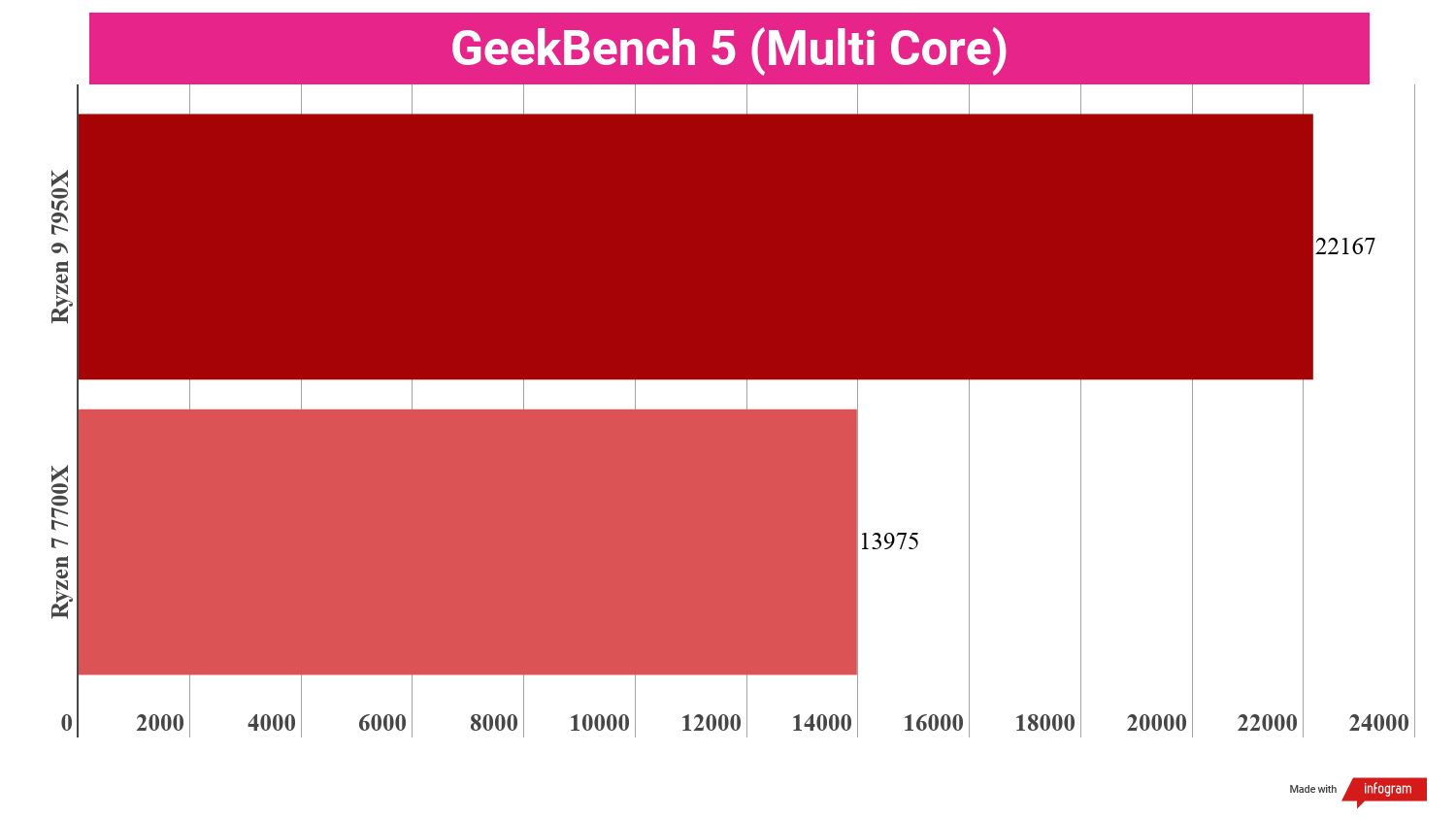
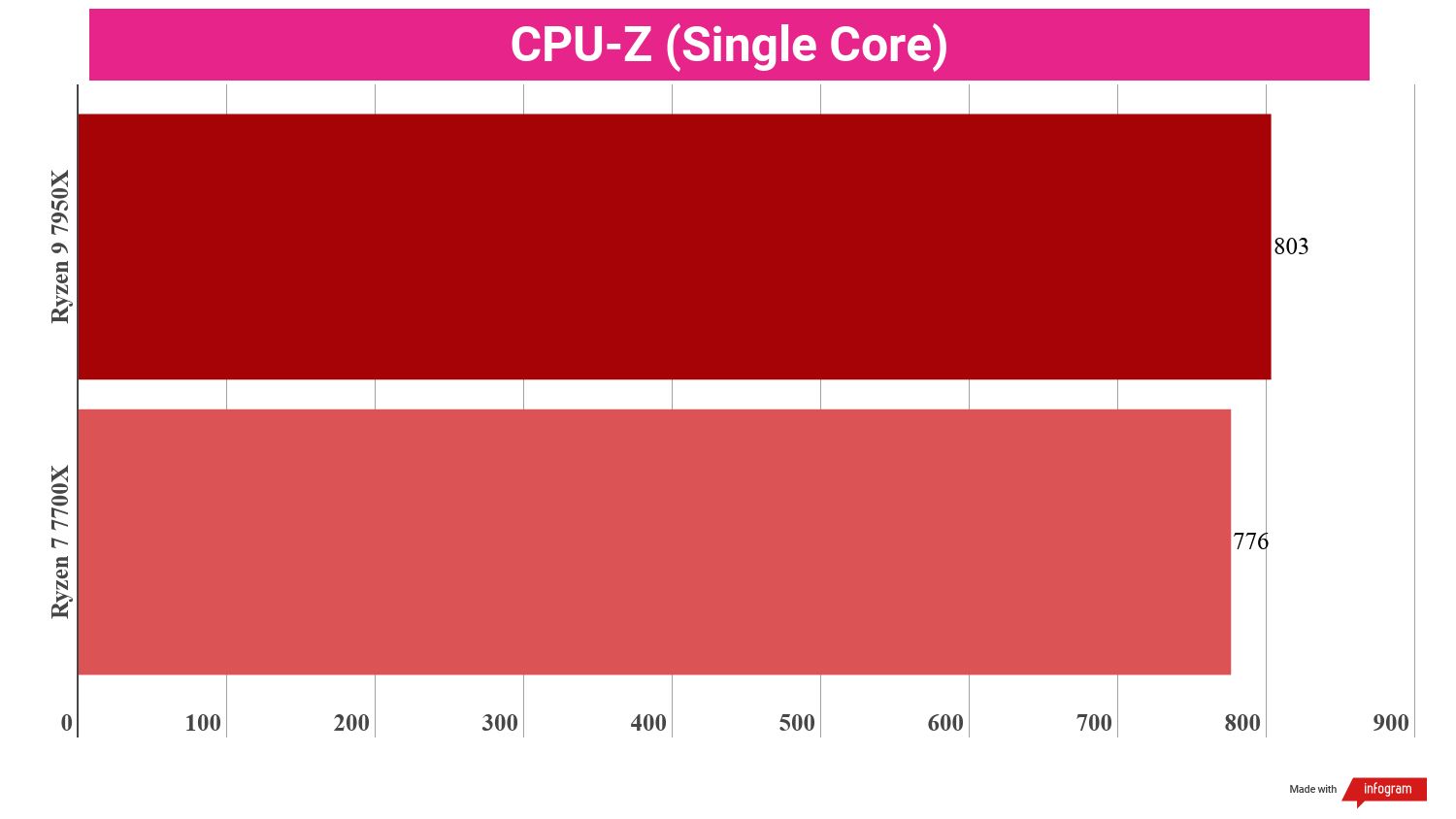
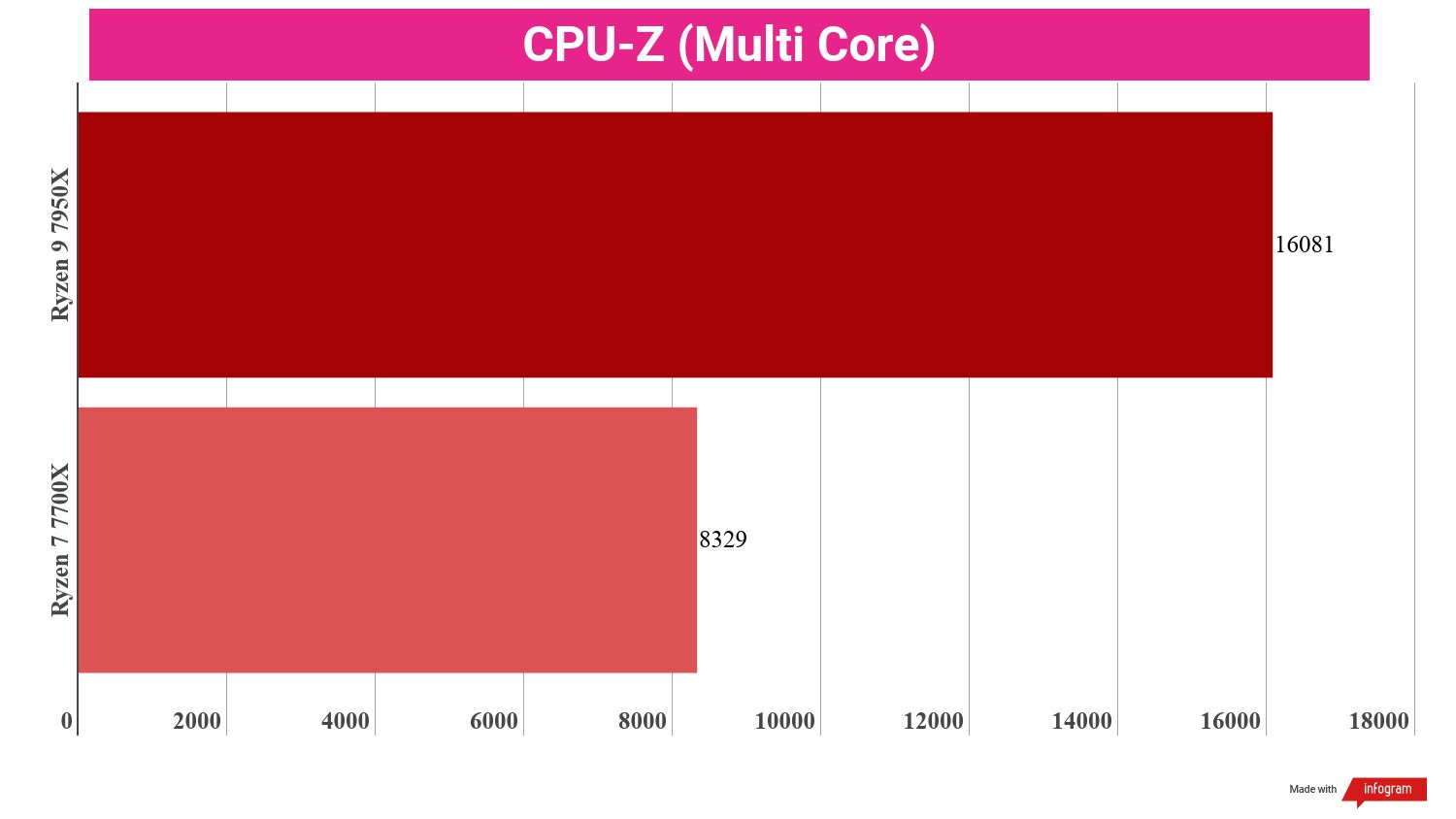
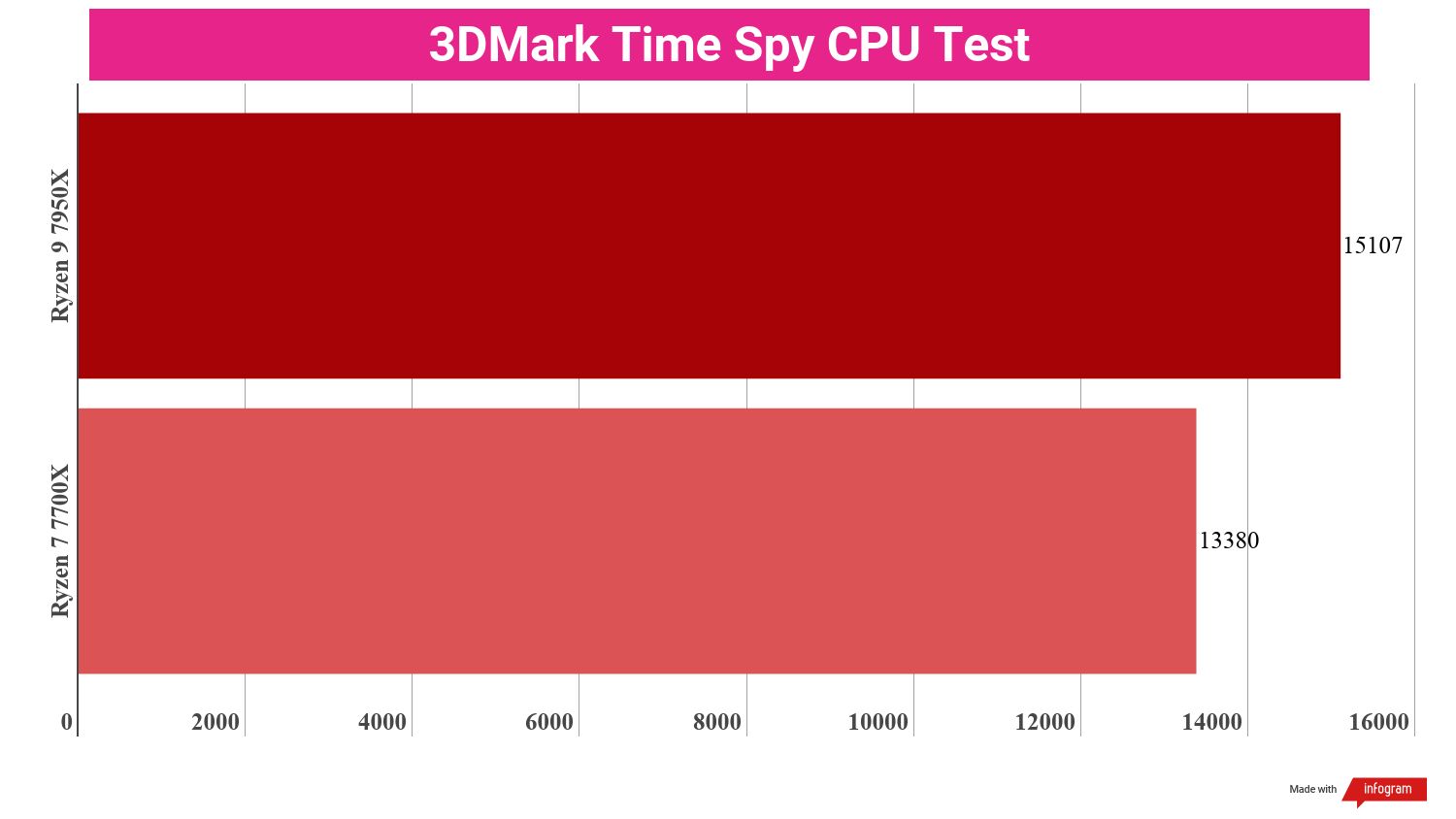
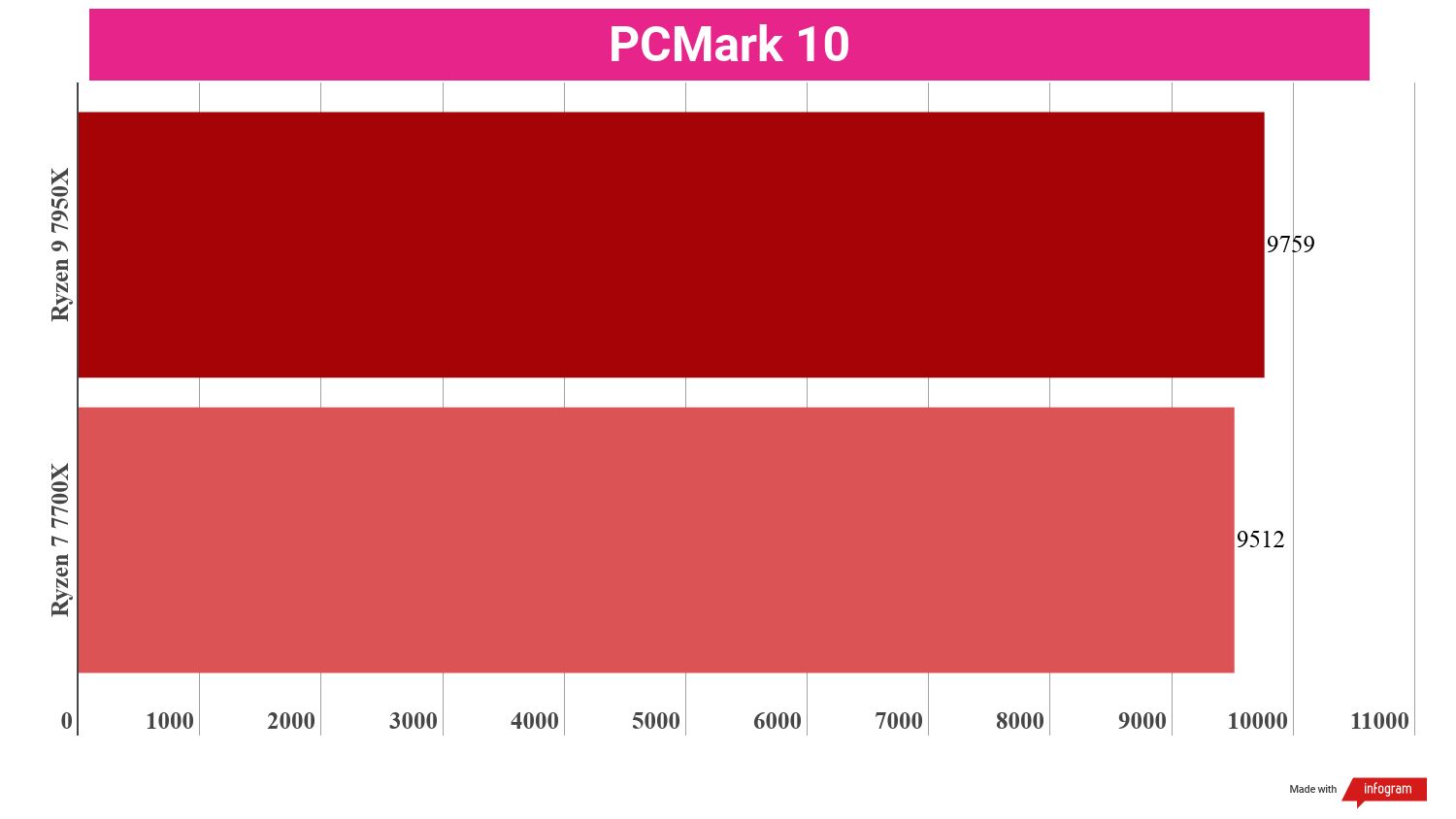
When it comes to the raw performance of the Ryzen 9 7950X vs the Ryzen 7 7700X, there are a couple of expected outcomes, but just as many surprises.
For starters, the single core scores of the two chips are closer than we thought they'd be, with the Ryzen 7 7700X coming within 40 points of the Ryzen 9 7950X across CineBench R23, GeekBench 5, and CPU-Z single core benchmarks. This is a credit to the Ryzen 7 7700X and is definitely reflected in some of the more specific application scores we saw in other tests.
It goes without saying that the multi core scores of the Ryzen 9 7950X would absolutely run circles around the Ryzen 7 7700X, considering that the former is a 16-core chip while the latter is an eight-core chip. This is more or less exactly what we saw, with the Ryzen 9 7950X scoring roughly 64% higher than the Ryzen 7 7700X in multi-core tests in CineBench R23, GeekBench 5, and CPU-Z.
In our 3DMark Time Spy CPU test, the Ryzen 9 7950X didn't do nearly that well, but it still performed about 13% better, scoring a 15,107 to the 7700X's 13,380.
The most interesting result though was from PCMark 10, however, which is used to measure general productivity performance across several different applications and tasks like word processing, video conferencing, and web browsing. In this test, there was very little difference between the two chips, though the Ryzen 9 7950X did come out slightly ahead of the Ryzen 7 7700X, scoring 9,759 to 9,512, respectively. This means that for most people, they really wouldn't be able to see any real difference between the two chips in day-to-day computing tasks.
Ryzen 9 7950X vs Ryzen 7 7700X: Creative Content
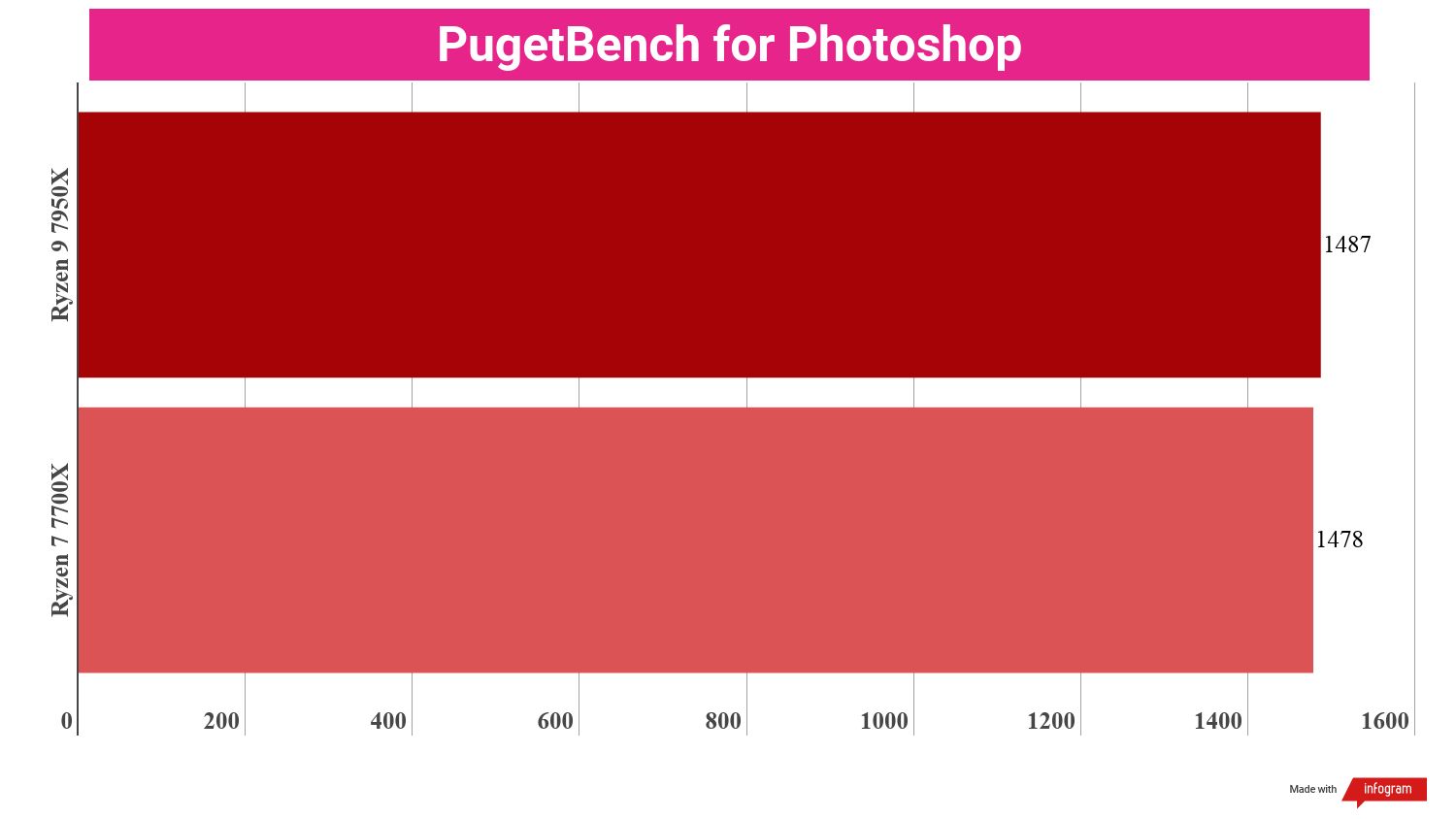
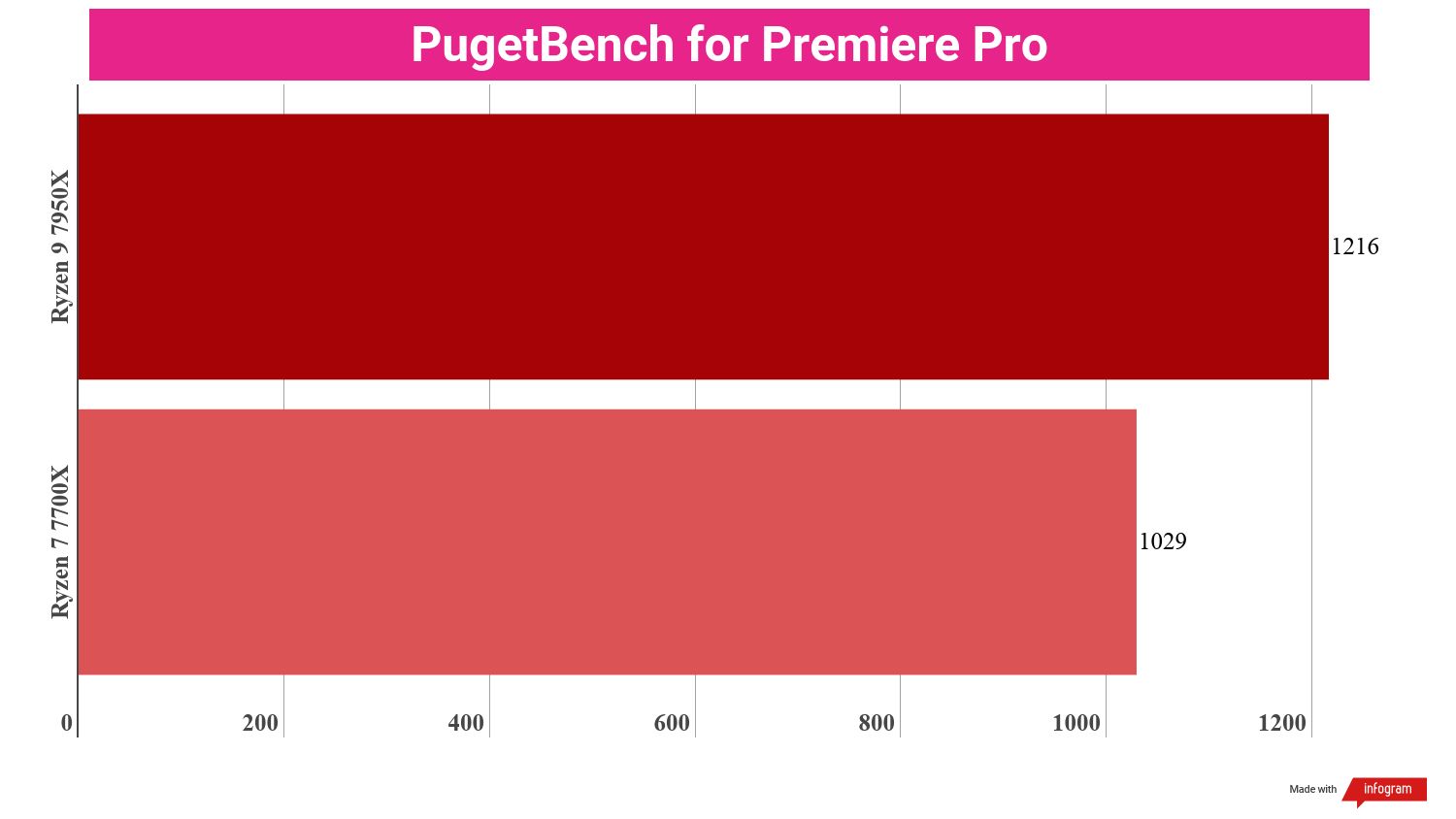
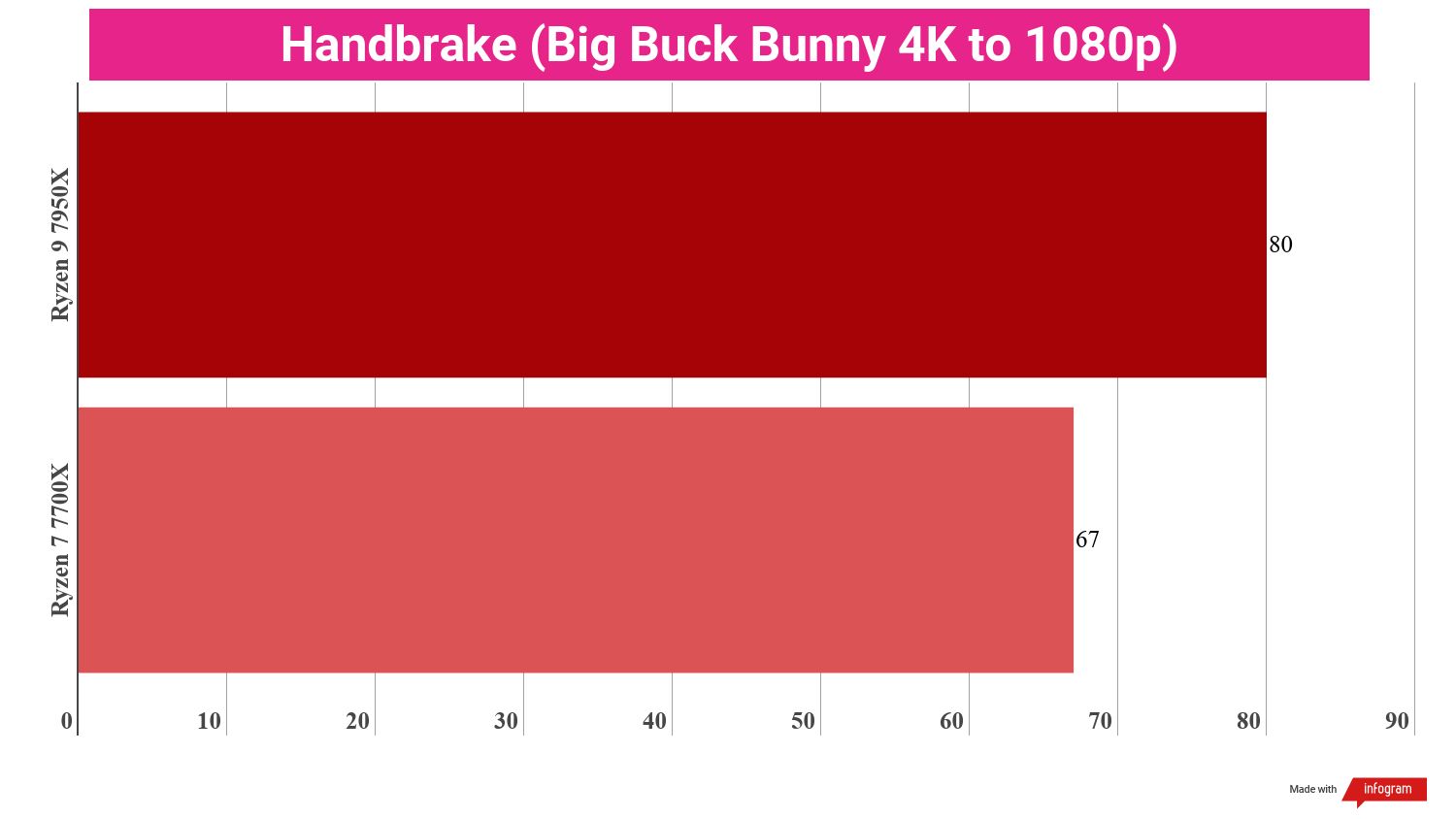
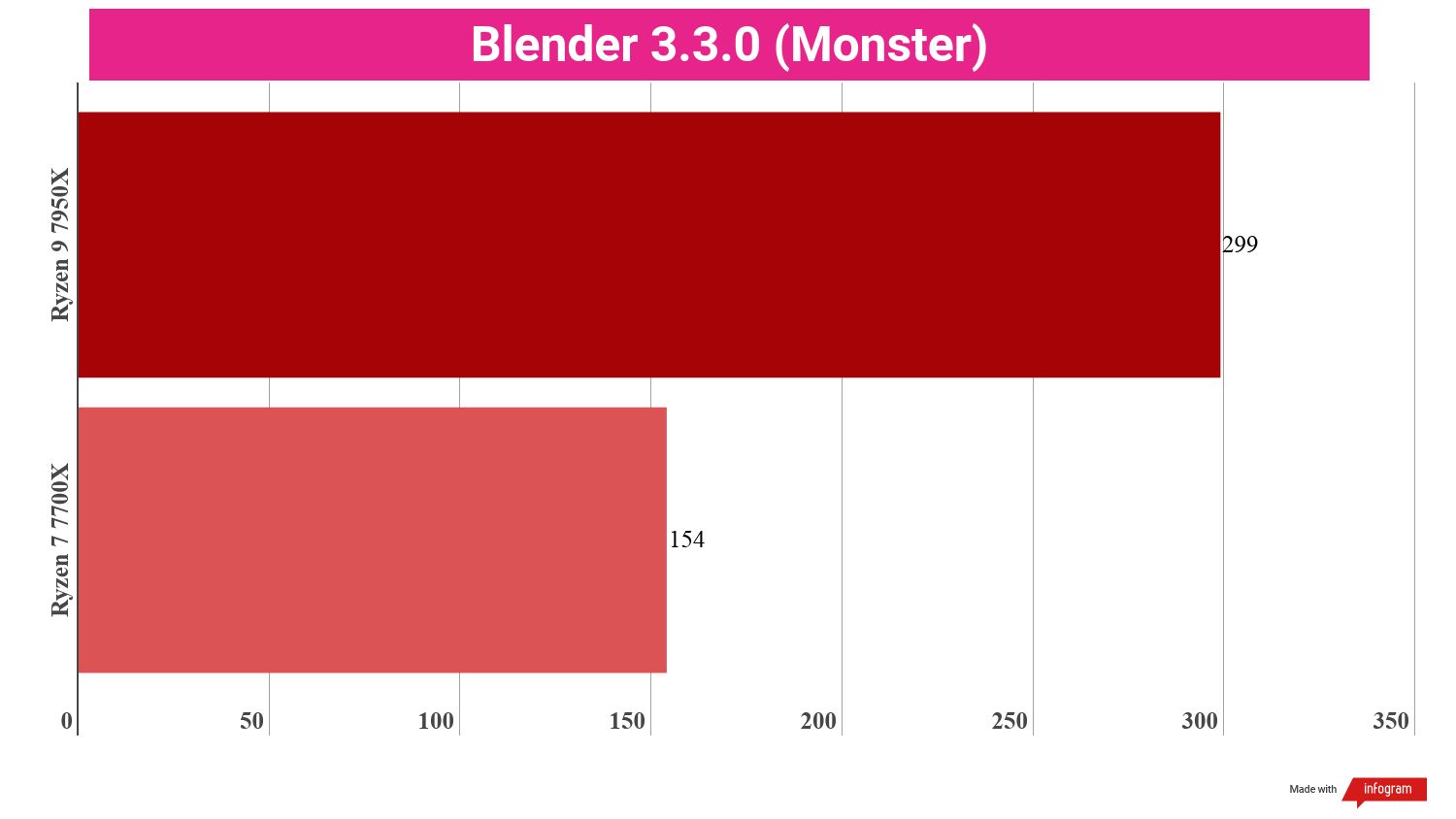
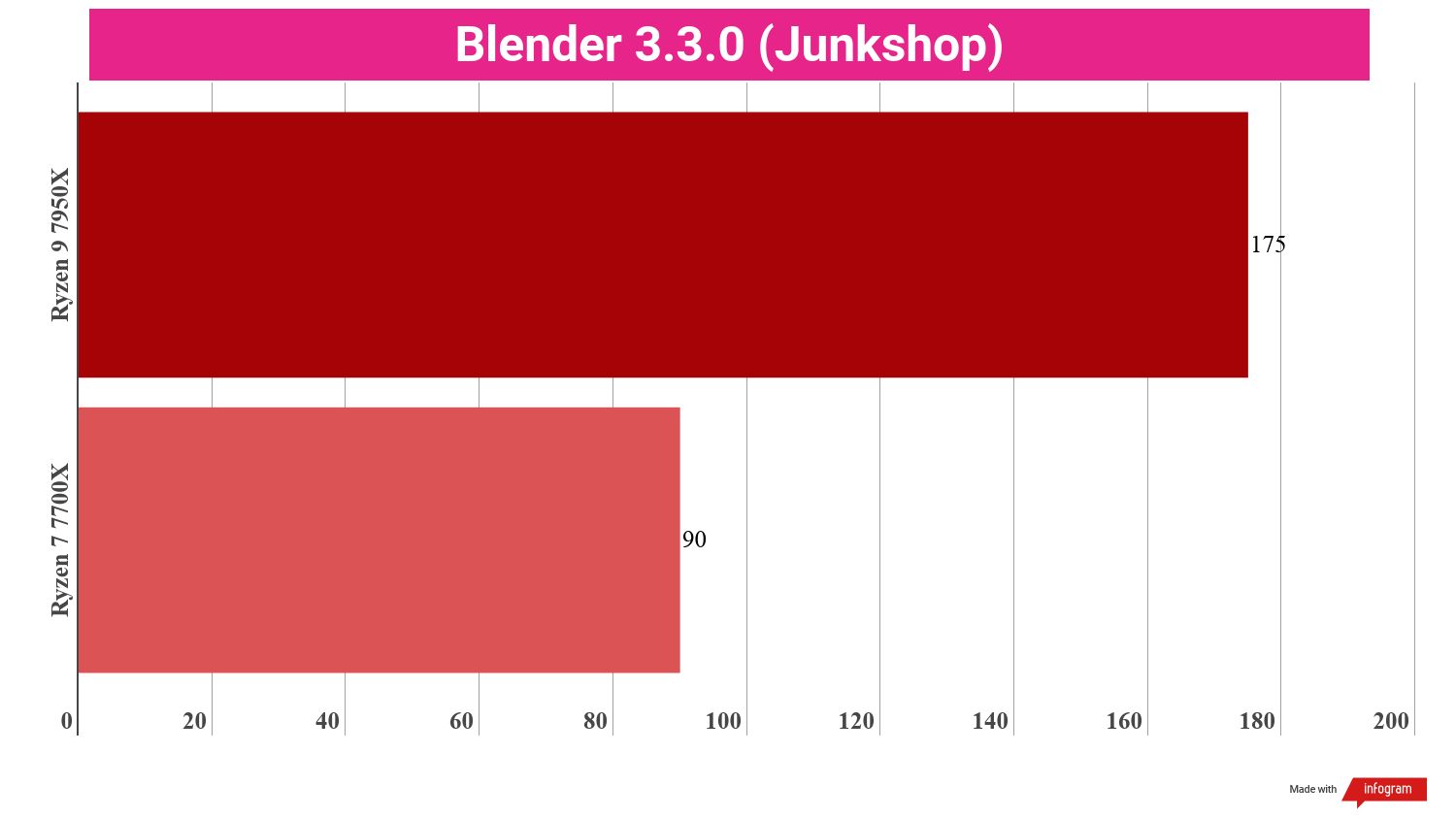
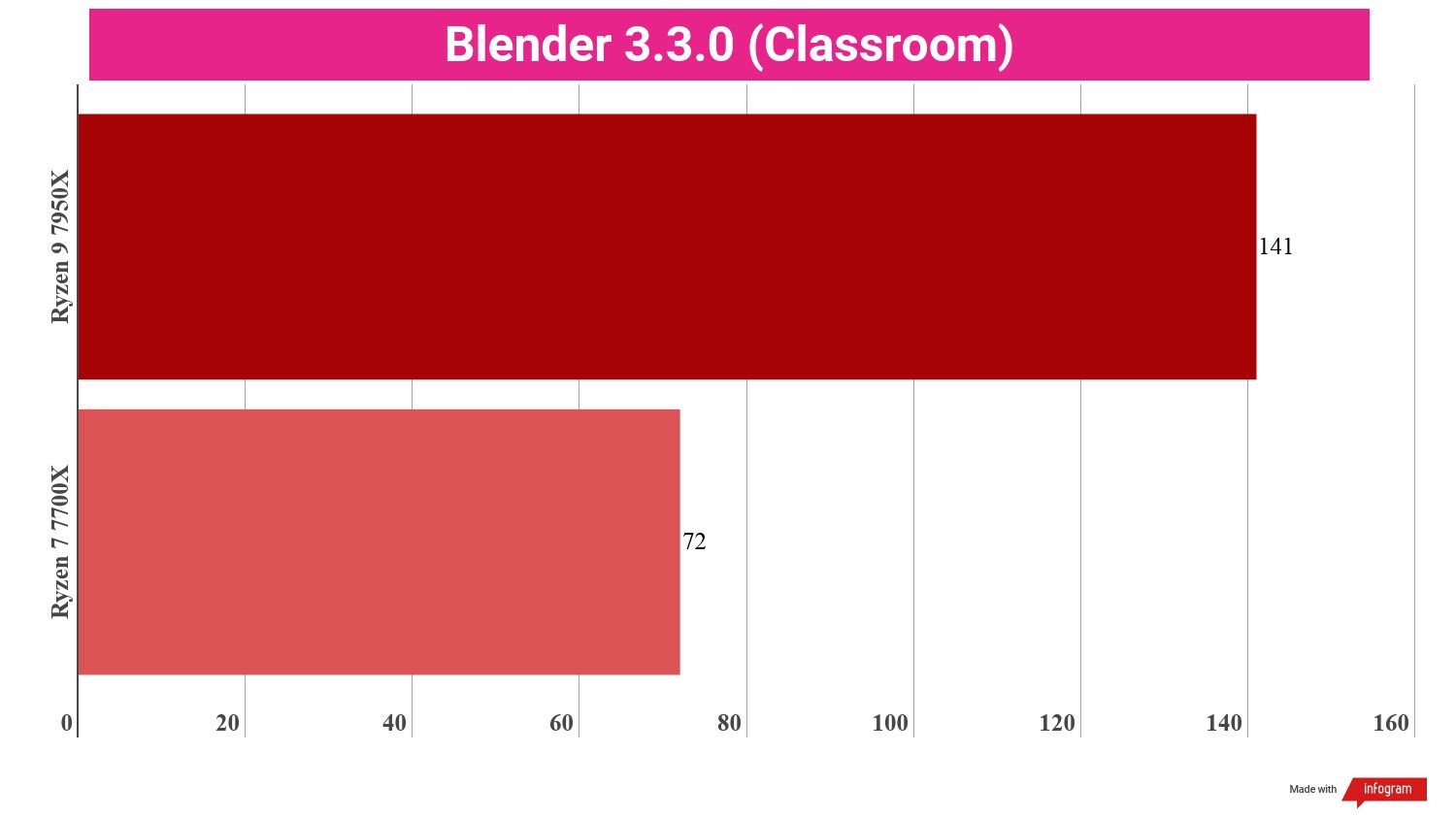
For creative workloads, the Ryzen 9 7950X really shined relative to the Ryzen 7 7700X.
The only benchmark where the two chips performed closest was with Adobe Photoshop, where the Ryzen 7 7700X scored nine points lower than the Ryzen 9 7950X on PugetBench for Photoshop, 1,478 to 1,487, respectively.
After that, it was off to the races for the Ryzen 9 7950X. In PugetBench for Premiere Pro, the Ryzen 9 7950X scored 1,216 to the Ryzen 7 7700X's 1,029, or about 18% better in the video editing benchmark. It was a similar story with Handbrake, where the 7950X encoded a 4K video into 1080p on the "fast" preset at about 80 frames per second, compared to the 7700X's 67 frames per second. Again, this is about 19% faster in the common video editing workload.
Where the Ryzen 9 7950X really soared though was in 3D rendering work, as tested in our Blender 3.3.0 benchmark, where the chip renders a 3D scene as many times as it can in one minute.
The 7950X rendered the Monster scene 299 times, the Junkshop scene 175 times, and the Classroom scene 141 times. The 7700X managed 153 times, 90 times, and 72 times, for each scene respectively. This has the 7950X rendering these scenes roughly 95% faster than the 7700X.
Ryzen 9 7950X vs Ryzen 7 7700X: Gaming
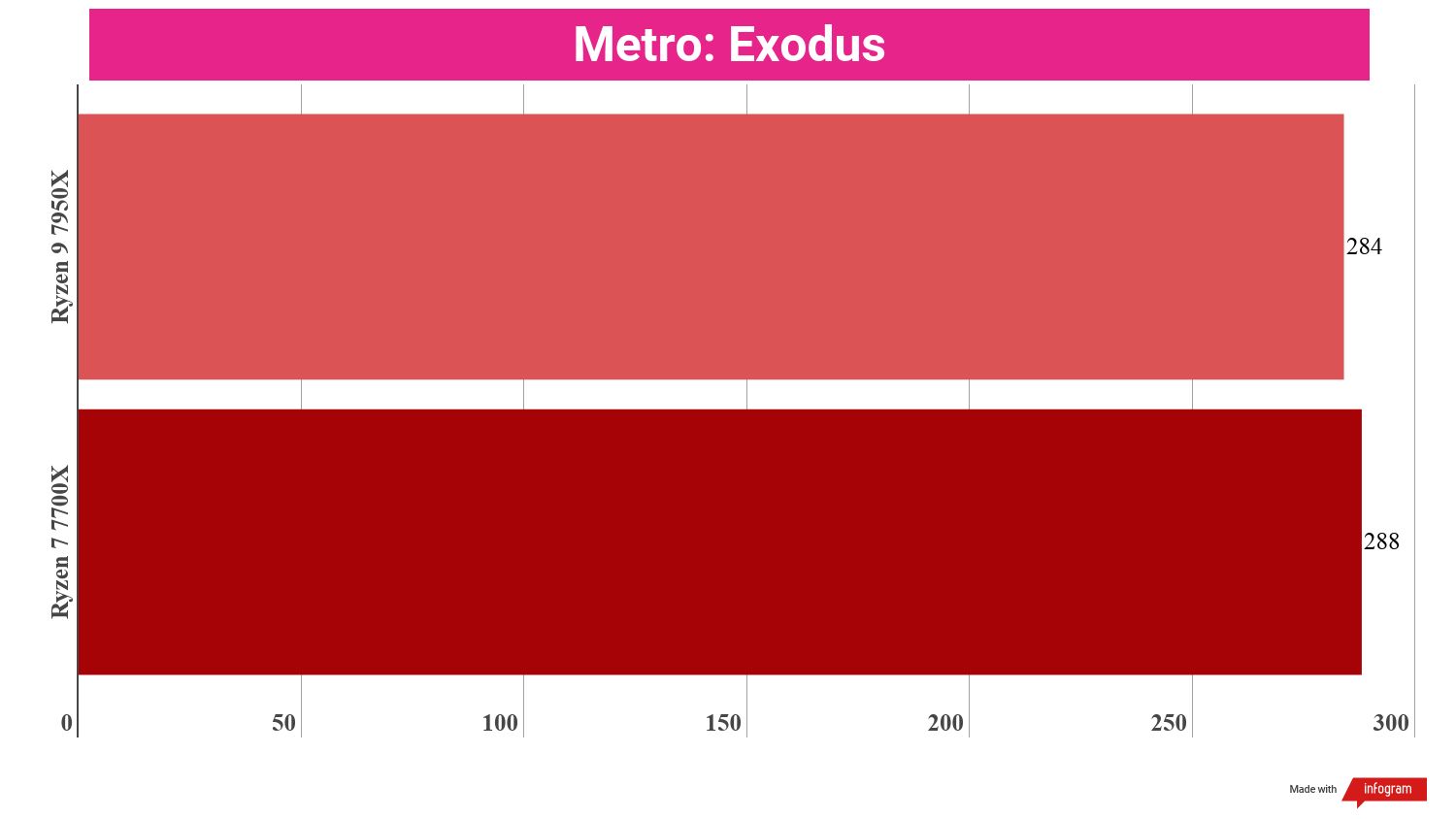
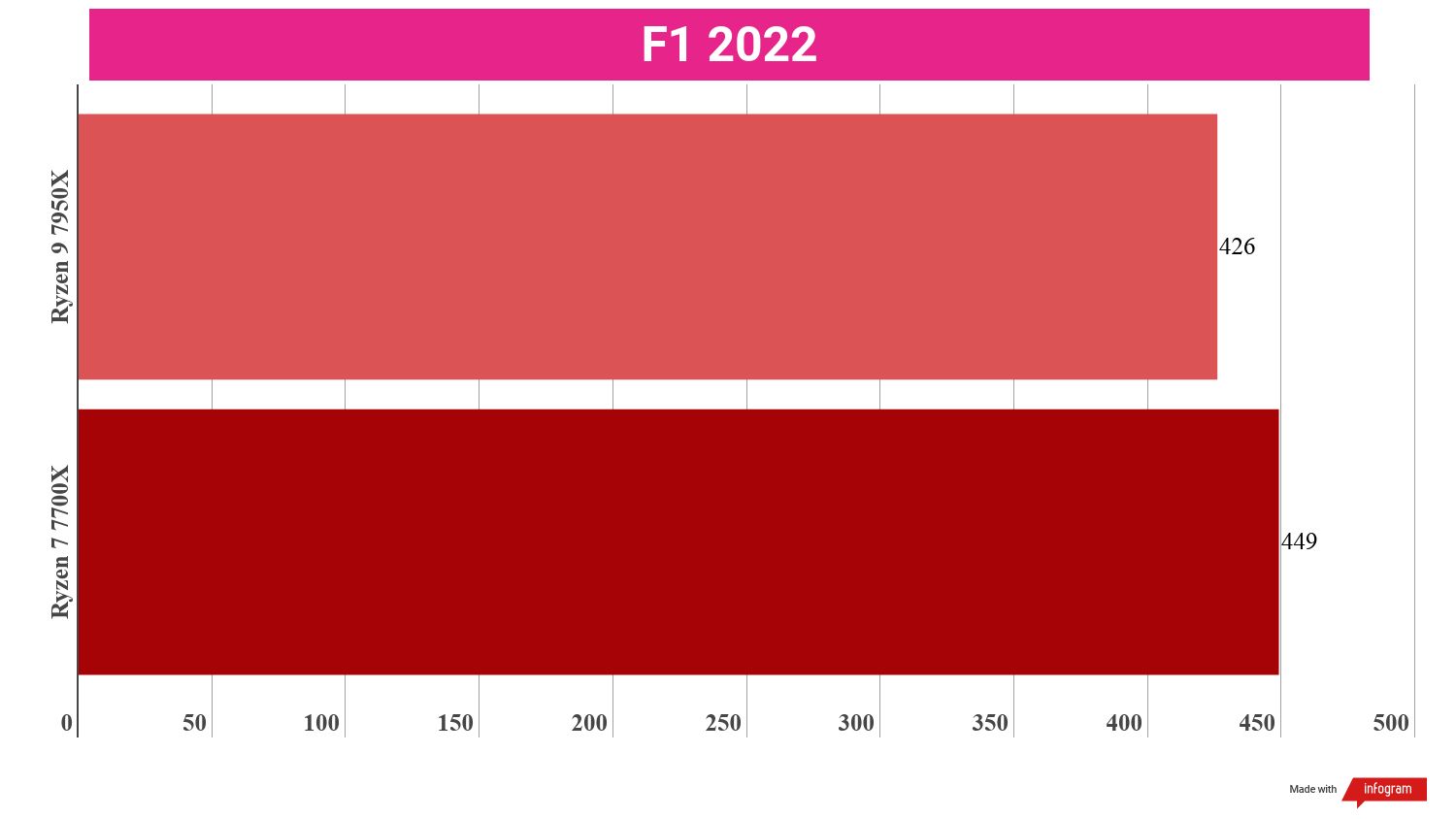
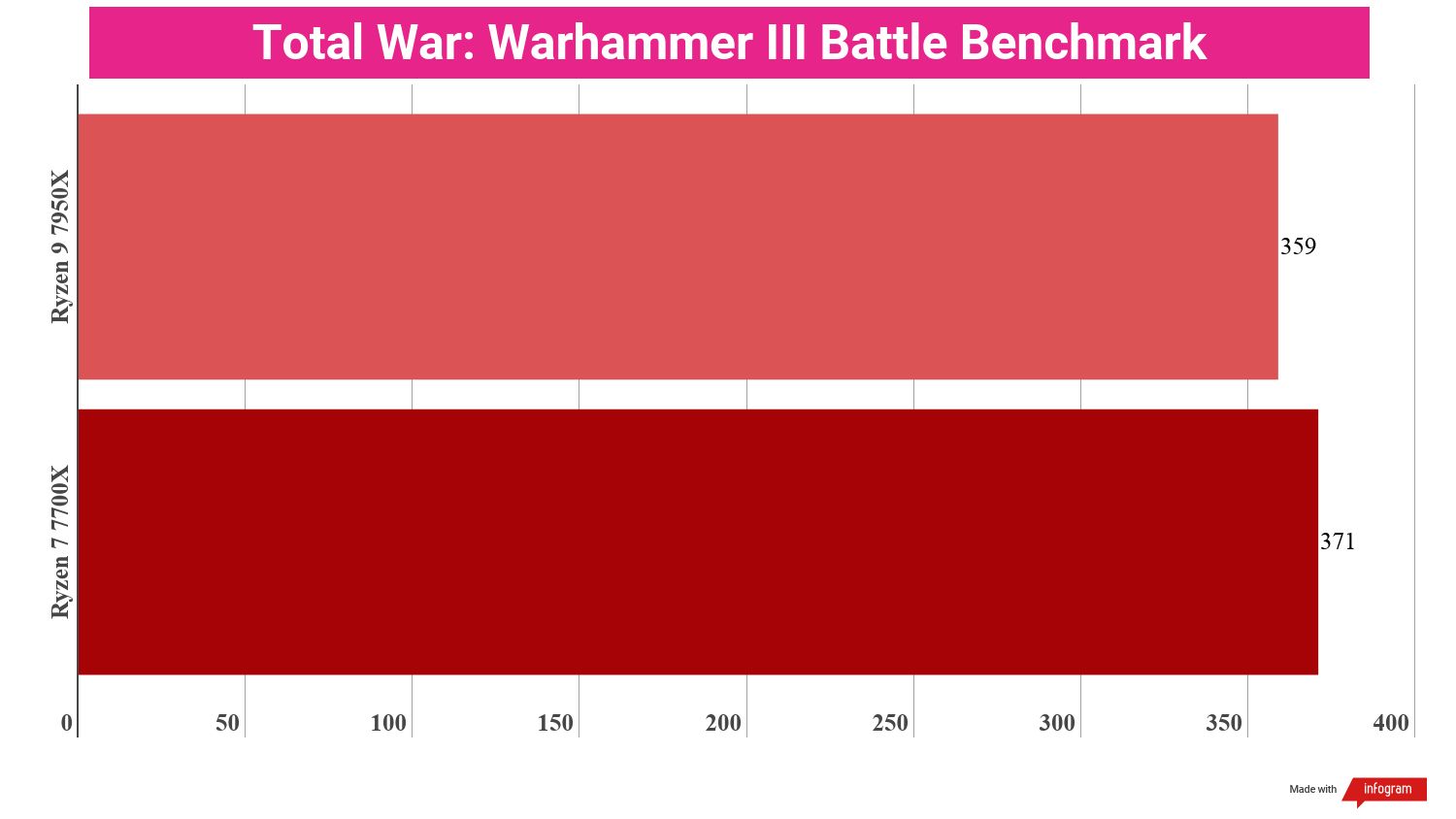
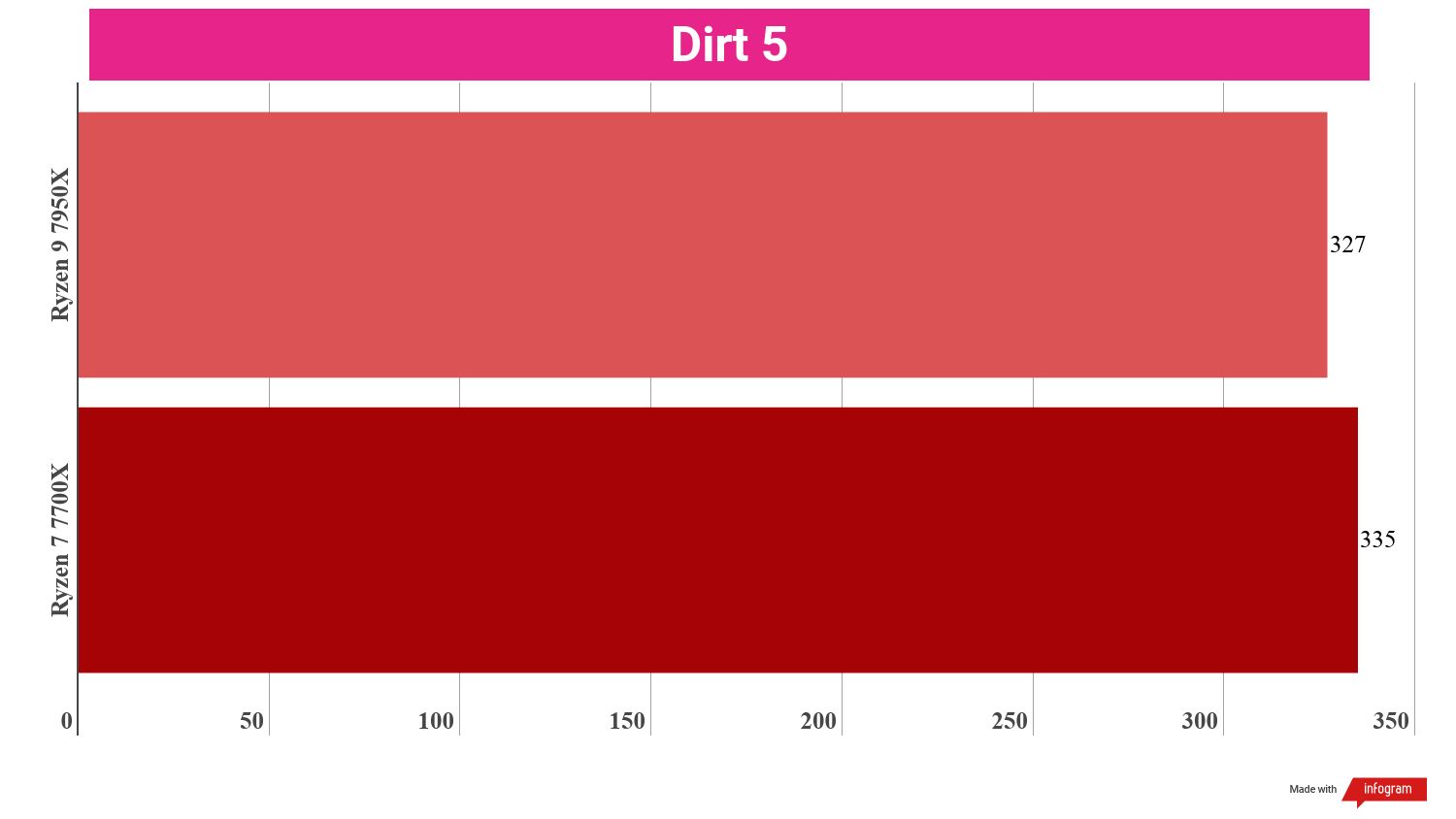
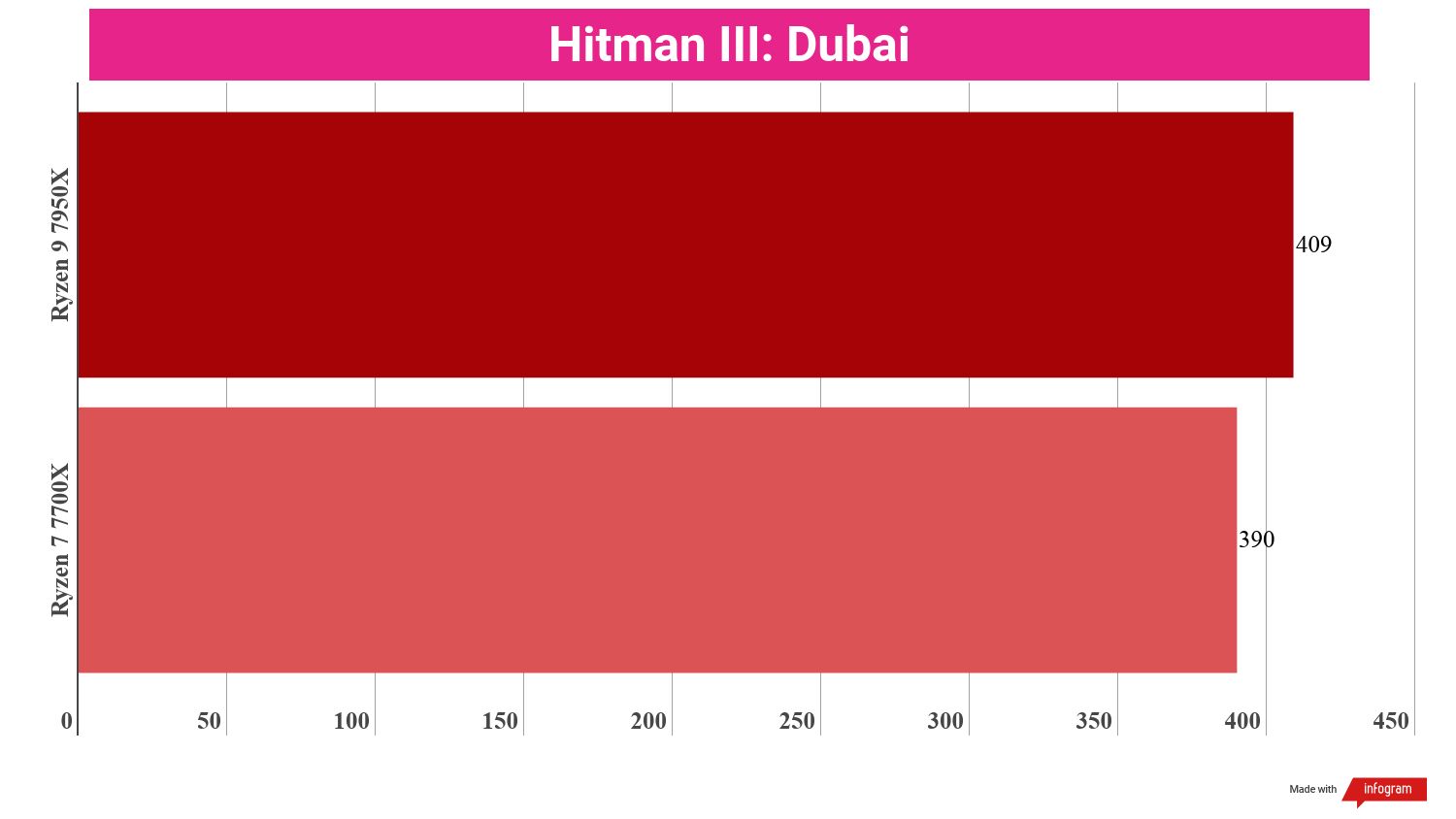
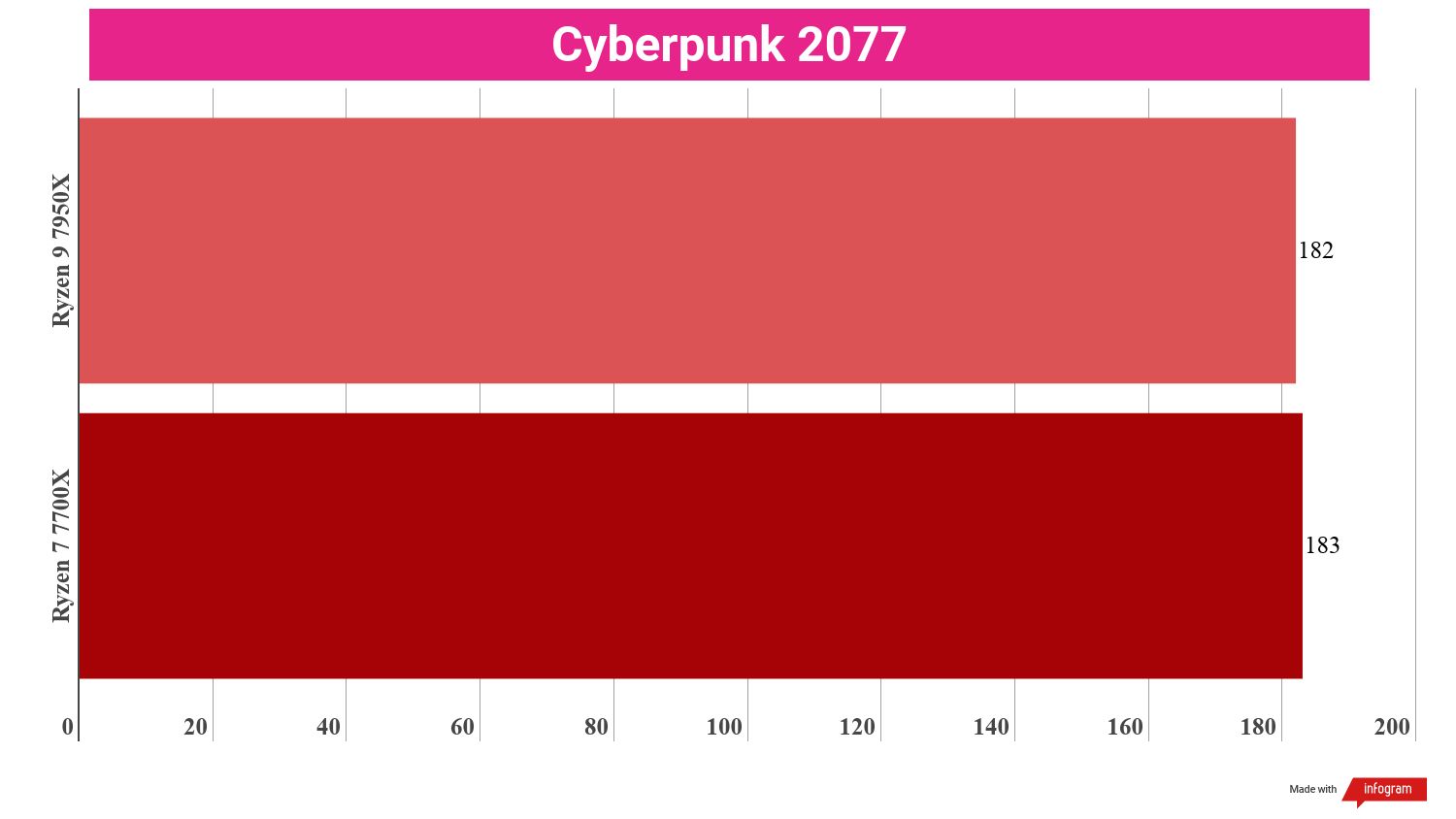
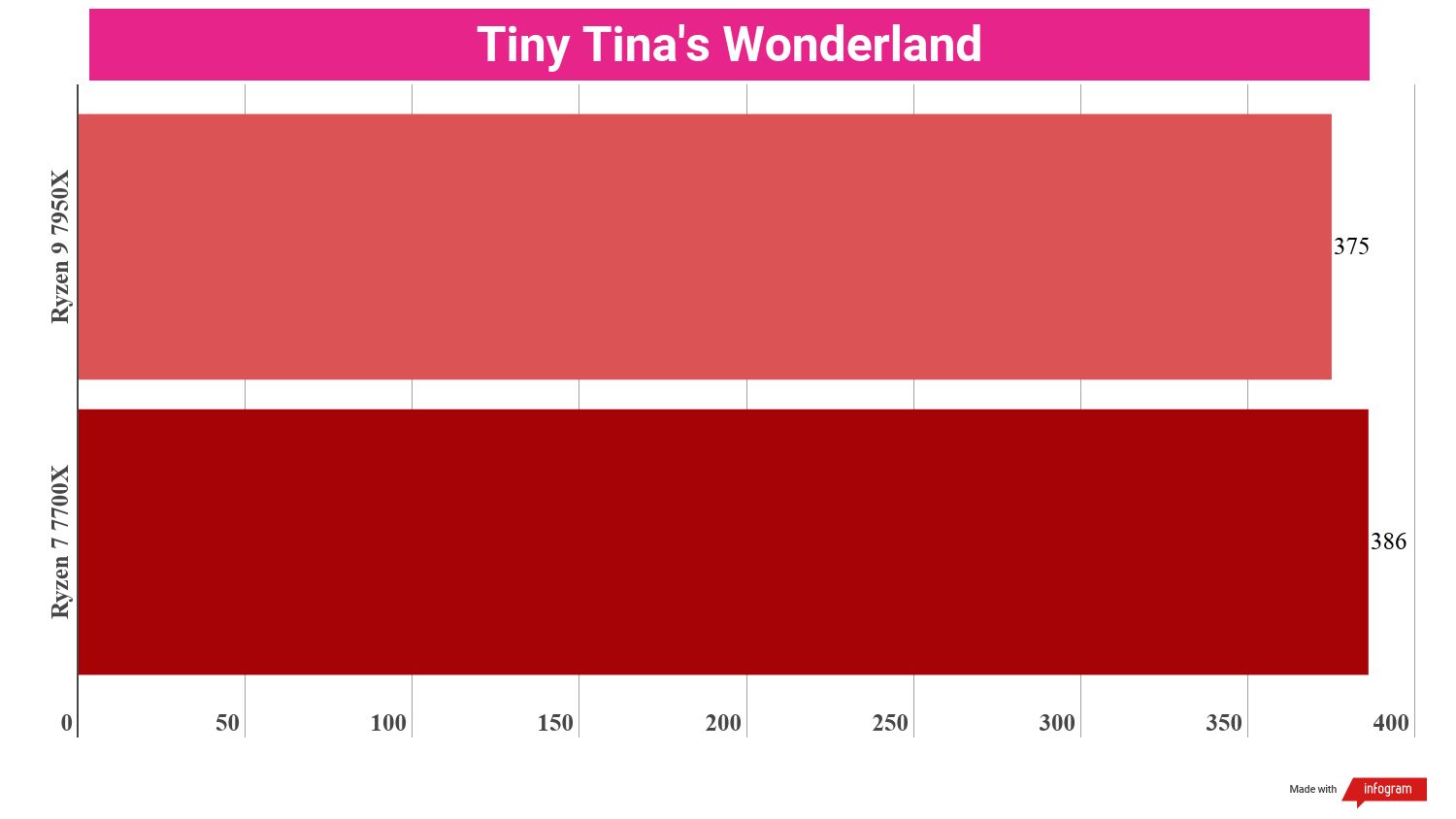
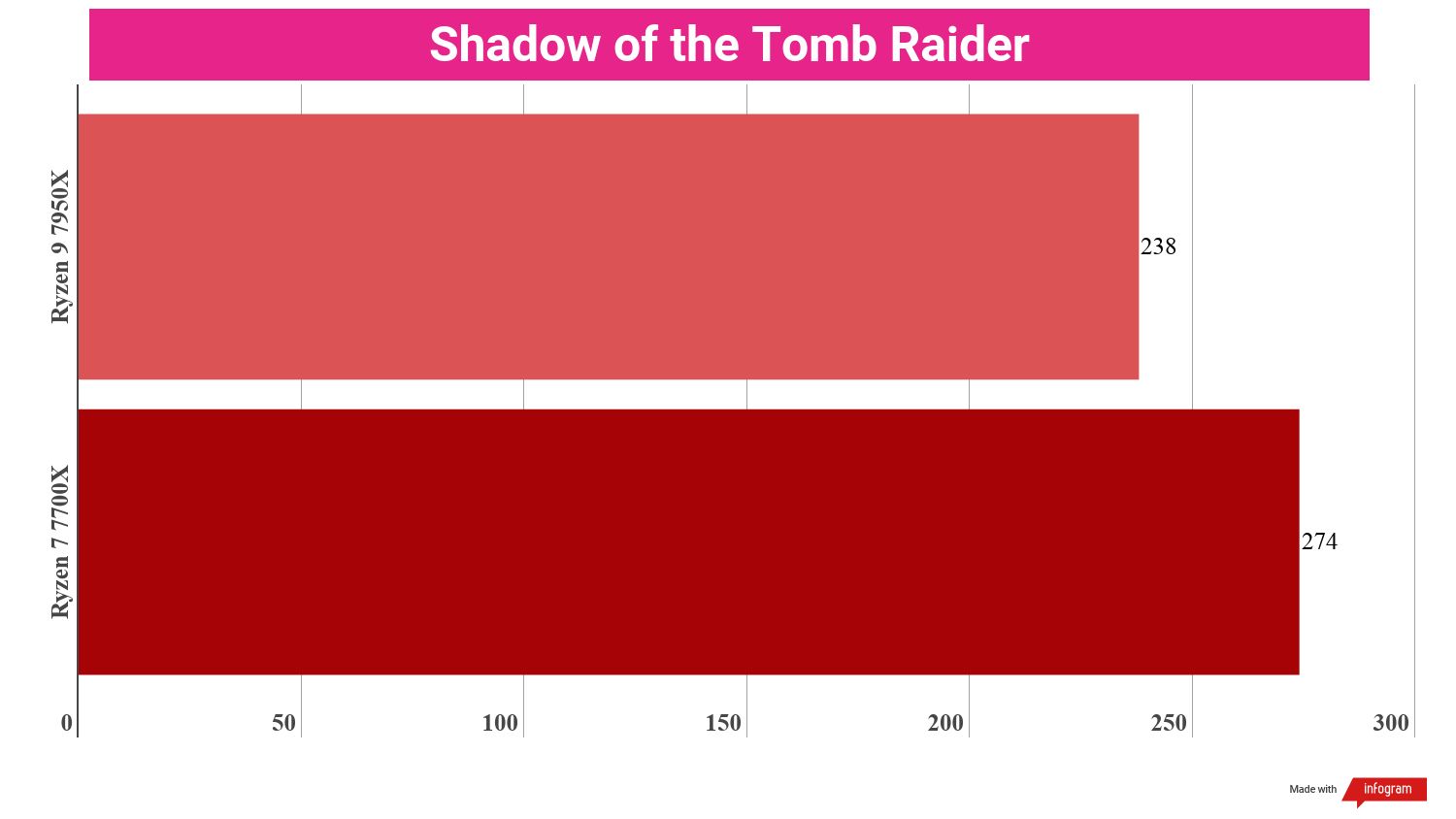
While the Ryzen 9 7950X might have taken the content creation crown, the Ryzen 7 7700X stunned us with its gaming performance.
When we test processor gaming performance, we run in-game benchmarks on some of the best PC games at 1080p on the lowest graphics settings possible, using the best graphics card we have available; in this case, the Nvidia GeForce RTX 3090.
This reduces graphic-rendering bottlenecks as much as possible to isolate those tasks that the processor alone is responsible for, namely in-game physics, AI, and anything else that isn't actually rendering the scene, which is the purview of the graphics card. We then record the average FPS of the benchmark over several runs to come up with a score.
Seeing as gaming is a task that is very much tied to single core performance, we expected the Ryzen 7 7700X and the Ryzen 9 7950X to be fairly close, but we didn't expect the Ryzen 7 7700X to beat the 7950X in nearly every benchmark we ran – and sometimes quite handily, too.
Only in our Hitman 3: Dubai benchmark did the Ryzen 9 7950X come out on top, 409 fps to the Ryzen 7 7700X's 390 fps. In all other benchmarks, the Ryzen 7 7700X scored a couple of fps better to roughly 20 fps better, and in the case of Shadow of the Tomb Raider, it absolutely blew the 7950X away, 274 fps to 238 fps.
On average, then, the Ryzen 7 7700X scored about 10 fps better in gaming benchmarks than the Ryzen 9 7950X, 335 fps to 325 fps. This even beats out the reigning champion of gaming processors, the AMD Ryzen 7 5800X3D, which scored an average of 328 fps across these same benchmarks.
Ryzen 9 7950X vs Ryzen 7 7700X: Conclusion
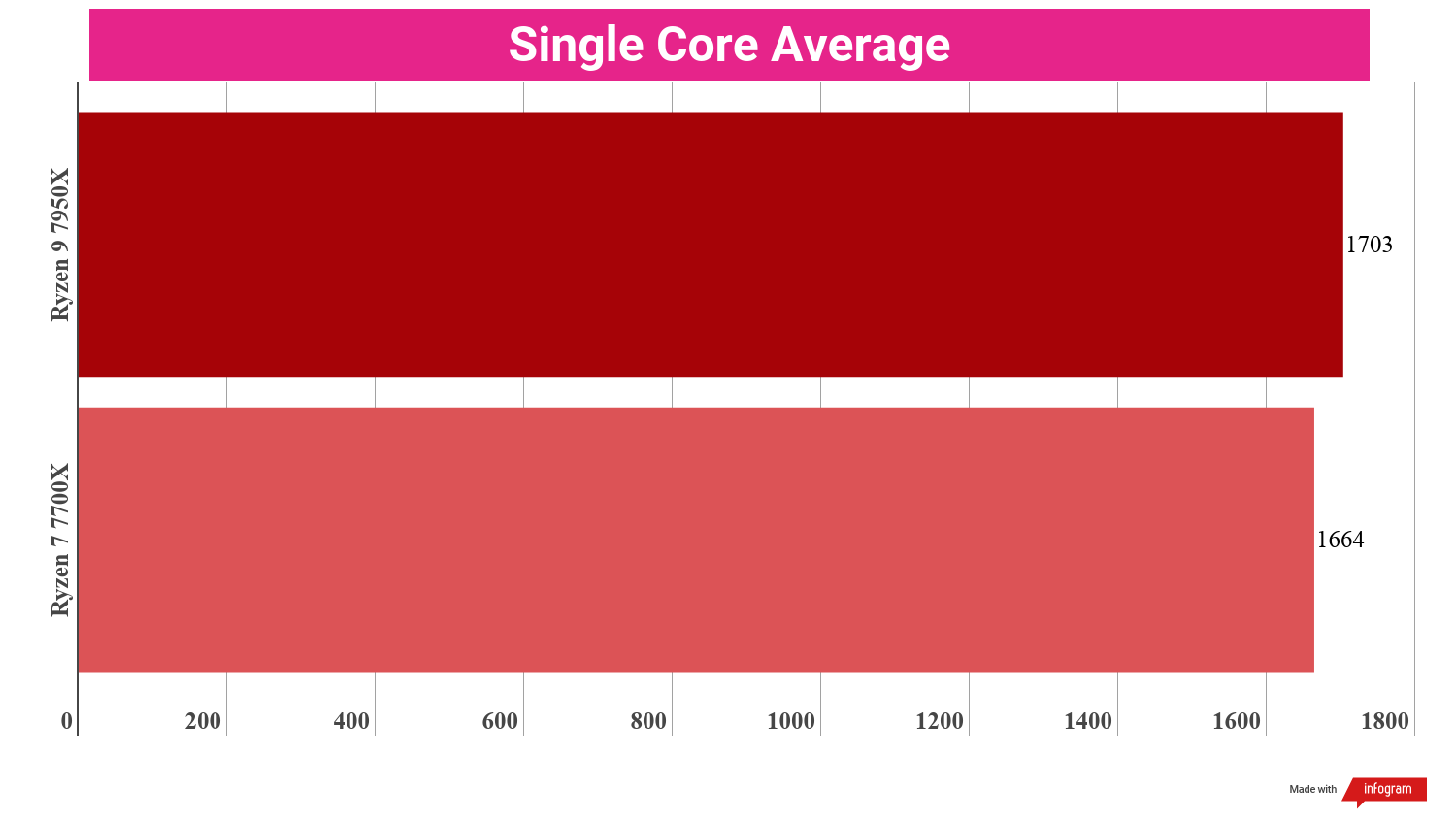
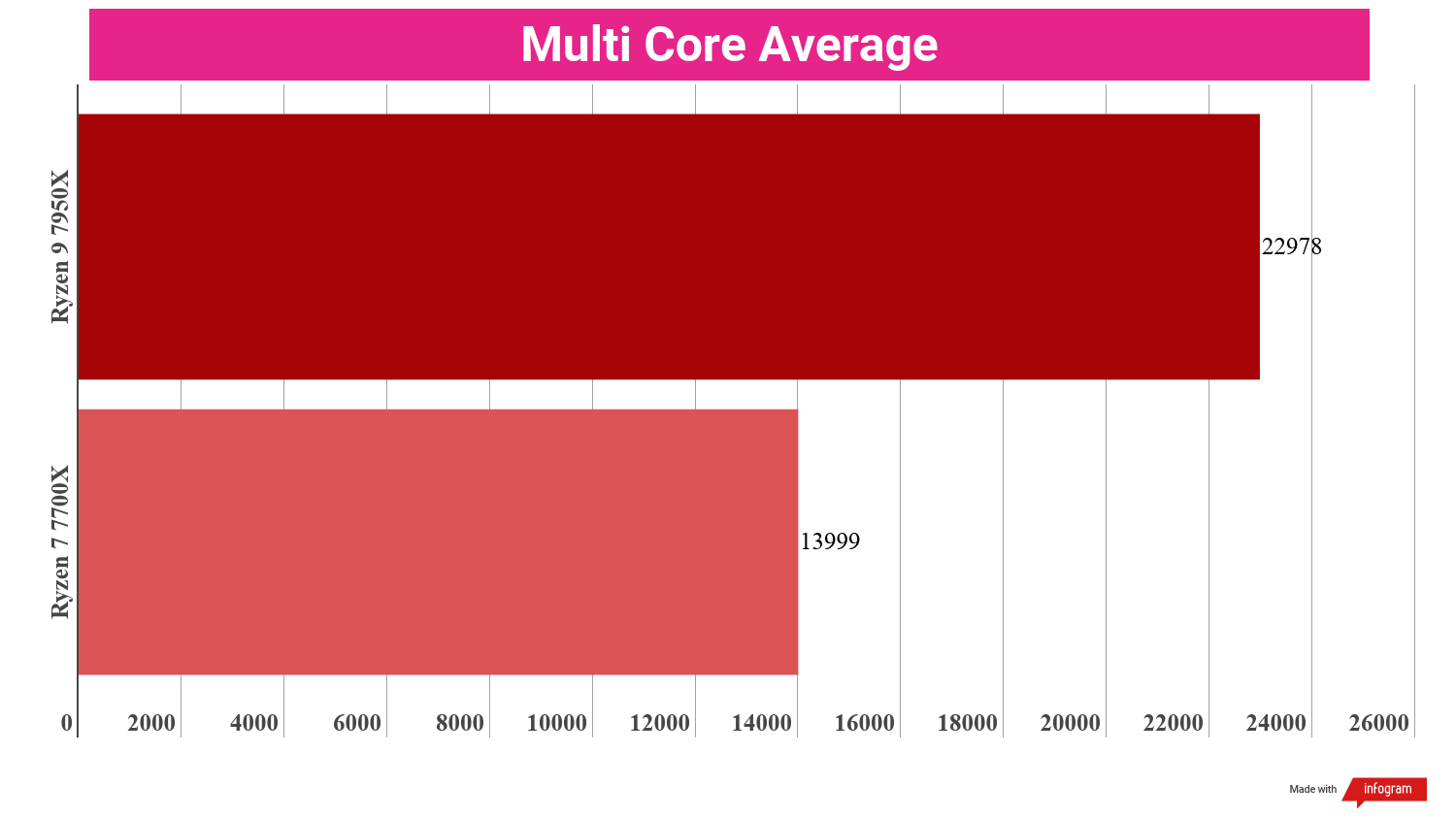
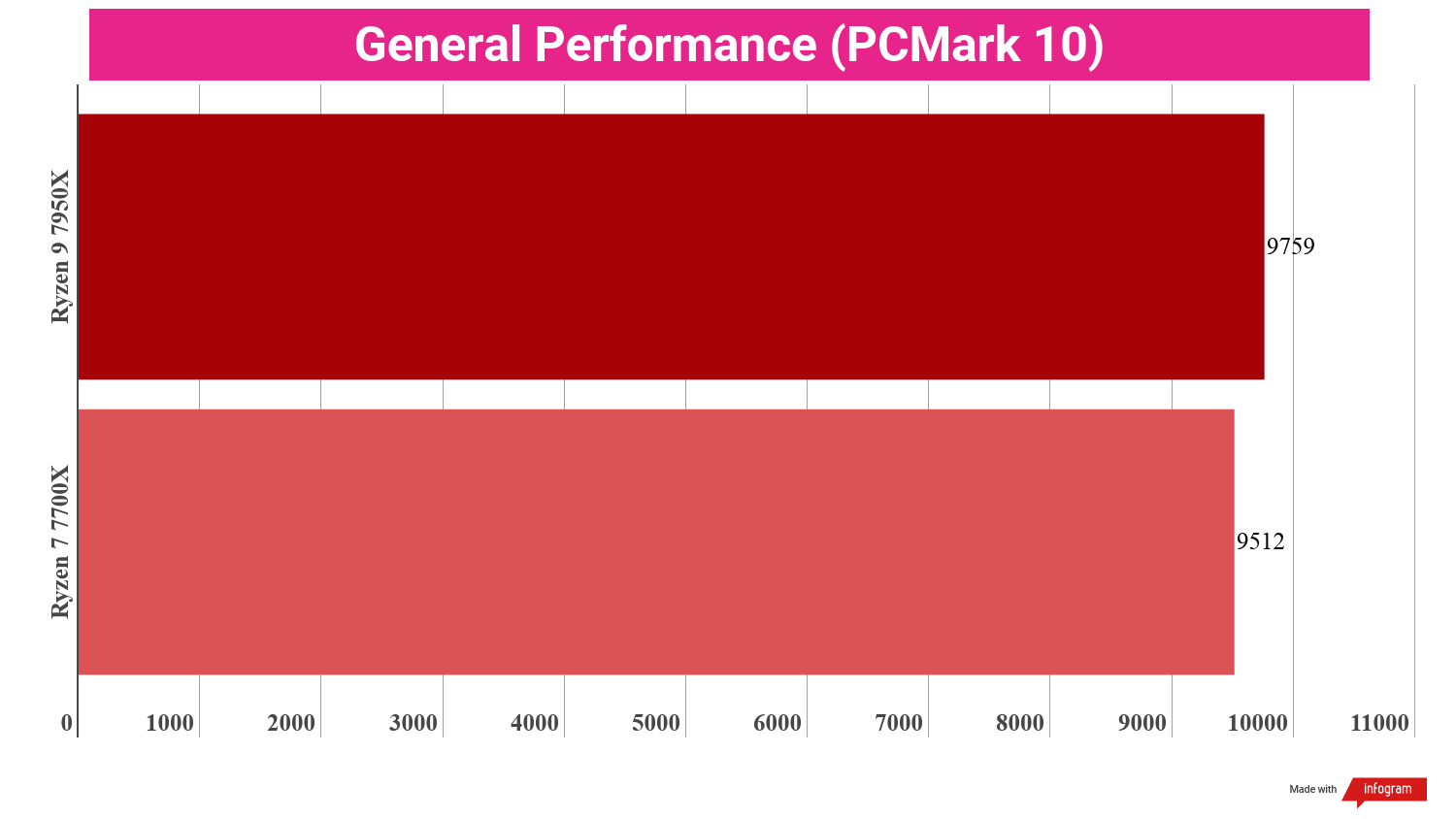
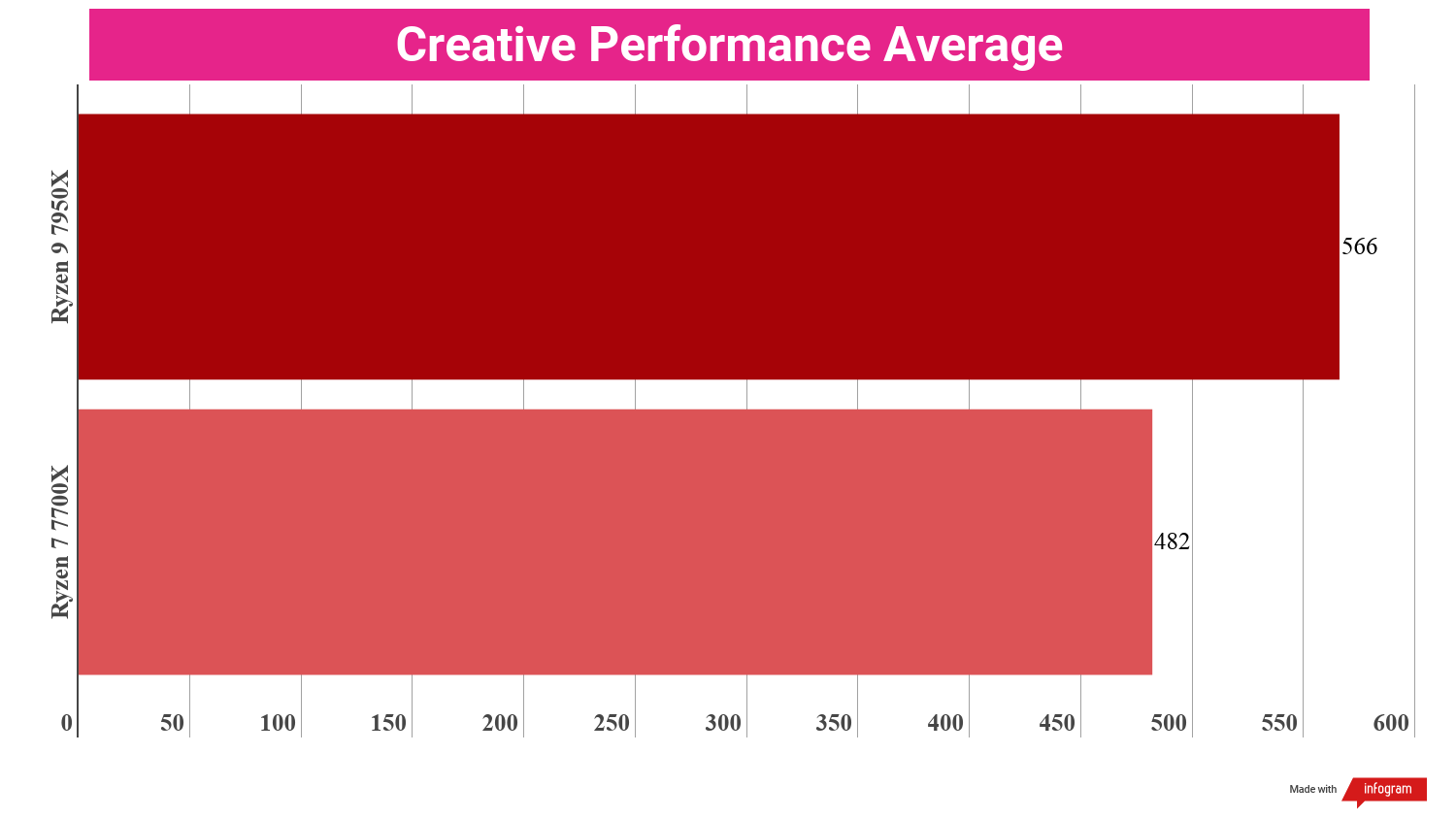
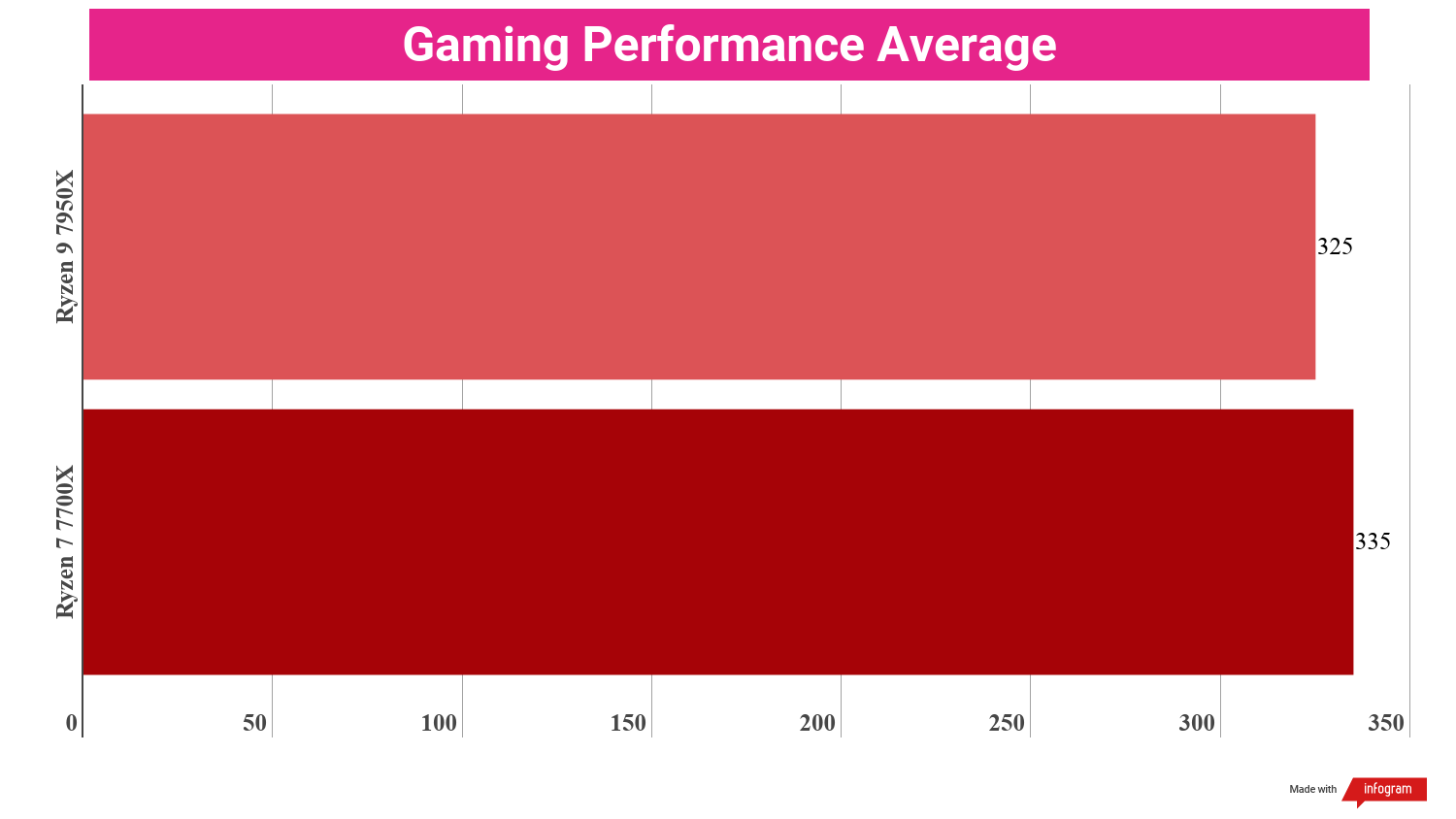
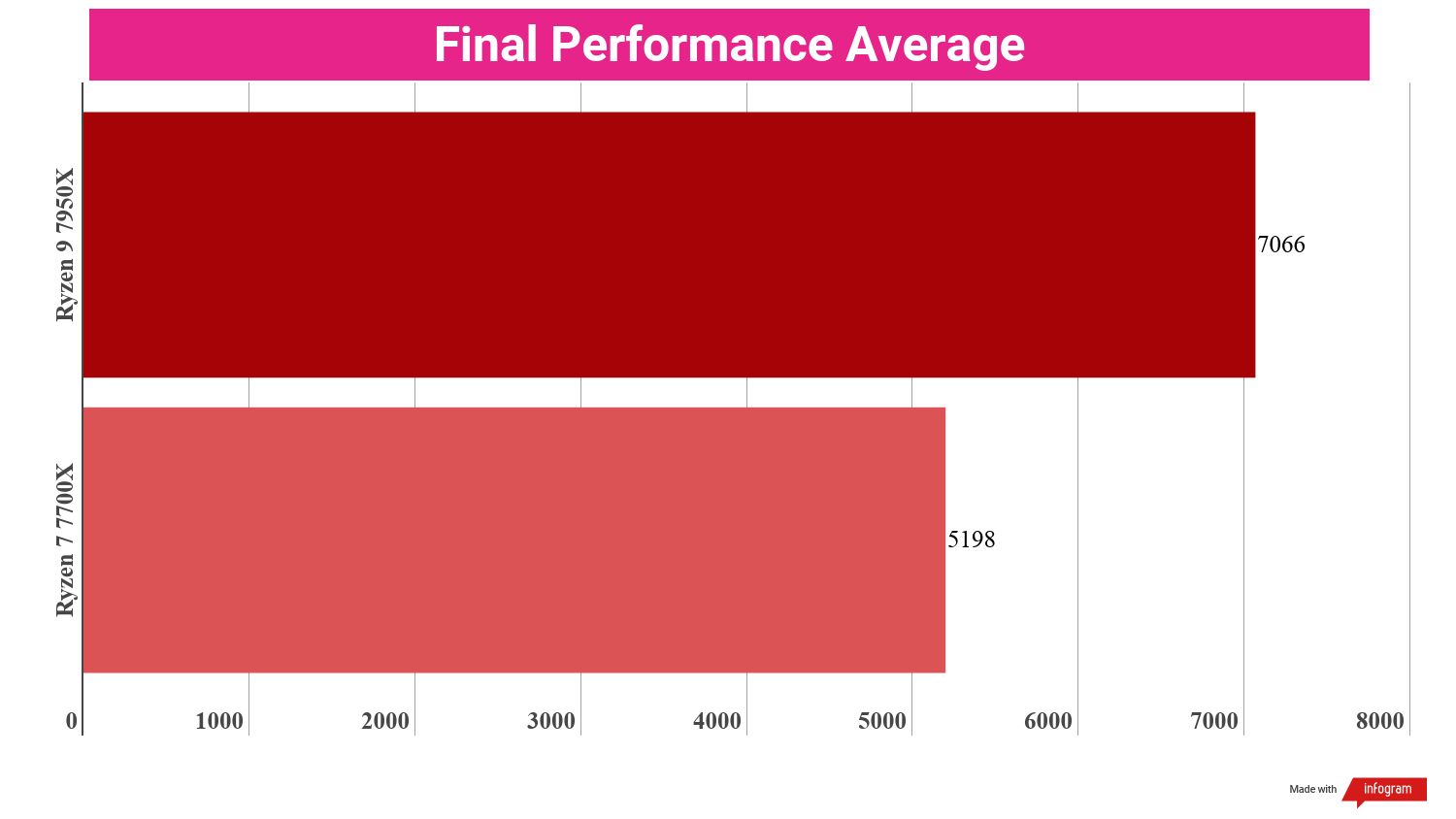
Wrapping up, whether you should buy the Ryzen 9 7950X or the Ryzen 7 7700X is a matter of budget and need. These are two of the best AMD processors ever made, and if you're coming from a Ryzen 3000-series or Ryzen 5000-series processor, either of these chips are going to feel like a revolution.
If money is no object and you want a processor that can whip whatever you throw at it, the Ryzen 9 7950X is the chip you want. It has outstanding performance across every category, besting its predecessor and its rivals on nearly every point. It is especially good for multi-core operations, which are heavily used in content creation fields so this is the best processor for creative workloads of the two.
Meanwhile, the Ryzen 7 7700X really comes out ahead on gaming performace, if only by less than a dozen frames per second on average, which is enough to really call it a wash overall. But when you consider that the Ryzen 7 7700X costs much less than the Ryzen 9 7950X, then there really is no question that the 7700X is the best processor for gaming on the market, and it's definitely the one builders are going to want to slot in so they can put that extra cash towards a better graphics card.
Regardless of which processor you go with, however, you are going to find excellent general performance, so the question really comes down to whether you are leaning more towards content creation or gaming – or at least which of the two is more important if you're hoping to do both. Of course, if you are on a tighter budget, the Ryzen 7 7700X is definitely the chip to buy, since you can still get excellent non-gaming performance for the price.

John (He/Him) is the Components Editor here at TechRadar and he is also a programmer, gamer, activist, and Brooklyn College alum currently living in Brooklyn, NY.
Named by the CTA as a CES 2020 Media Trailblazer for his science and technology reporting, John specializes in all areas of computer science, including industry news, hardware reviews, PC gaming, as well as general science writing and the social impact of the tech industry.
You can find him online on Bluesky @johnloeffler.bsky.social